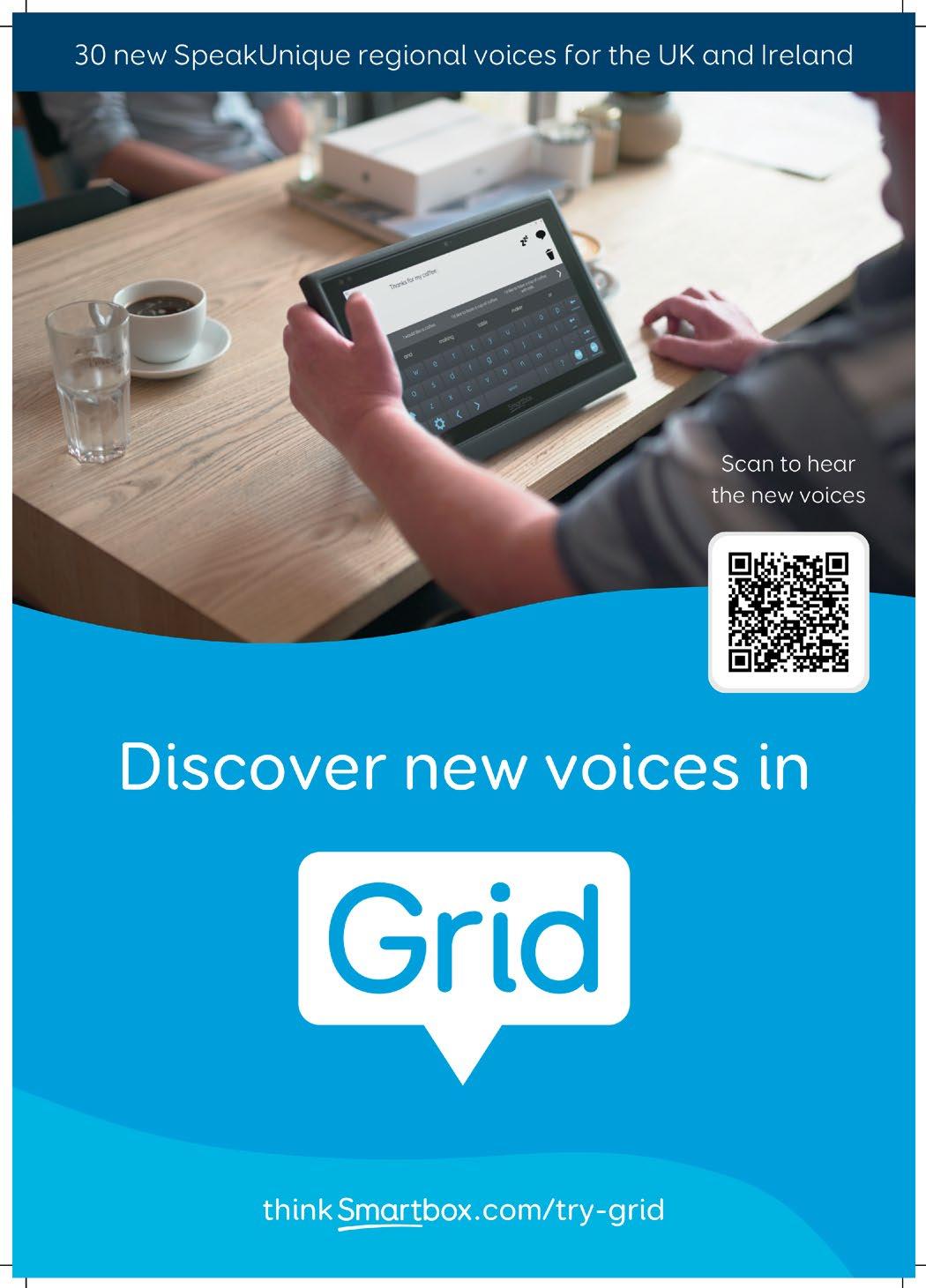Making memories
MND families having fun together





PAGES 4-5
Women behind MND research
Talented female researchers share their thoughts
PAGE 9
Tanya Curry Q&A
We sit down with our new Chief Executive
PAGE 15
New honour for Rob and Kev Patrons given the Freedom of Leeds
PAGE 18
Support grants
How our support grants can have a lasting impact
PAGES 20-21
Memory making Families come together for our event in Kendal
On the cover: Rob Abraham, who is living with MND, watches as his son takes part in an activity at our recent family fun day in Kendal.
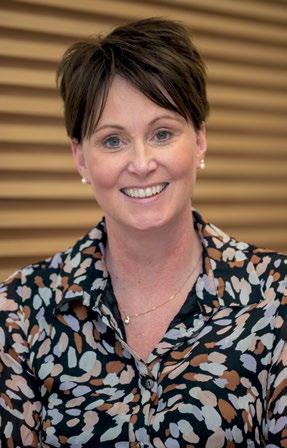
It is an honour to write my first Welcome piece for Thumb Print as the MND Association’s new Chief Executive.
Last year was a very special year for our Association. It was the year we raised over £30 million for the first time and the year we launched our Promises to the MND community.
We have promised everyone living with or affected by MND, we won’t rest until:
• MND is treatable and ultimately curable
• You get the care you need, when you need it
• Every day counts
• You are heard
• No one faces MND alone
Thumb Print is the quarterly magazine of the Motor Neurone Disease (MND) Association, Francis Crick House, 6 Summerhouse Road, Moulton Park, Northampton, NN3 6BJ Reg. charity number 294354.
Editorial and advertising enquiries:
Telephone 01604 250505
Email editor@mndassociation.org
If you have comments or feedback about the magazine and its content, please do not hesitate to get in touch.
Thumb Print is available to read online and as a downloadable pdf at www.mndassociation.org/
thumbprint
The views expressed in Thumb Print are not necessarily those of the Association. The advertisement of third party products or services does not in any way imply endorsement by the MND Association nor that those products or services will be provided, funded or available via the Association. All content © MND Association 2022.
Our Promises will continue to drive everything we do during 2023 and beyond. We must embrace the opportunity to build on our work; to drive forward the research that will deliver effective treatments; to collaborate to ensure people have the co-ordinated care and support they need; to campaign for a better quality of life; to inspire more people to fundraise for us; and to amplify the voices of people affected by this brutal disease.
This is a very exciting time to join our Association. Since I arrived in January, I have seen the passion and determination throughout the MND community.
We need to continue our work to make sure we give the MND community a voice in what we’re doing and how we’re doing it. No one person or one organisation can do everything on their own and we should continue to work collaboratively and in partnership, so the diversity of knowledge and experience collectively gives our community much better outcomes.
You – our members, supporters, volunteers and campaigners – are making a difference every day. Today we are nearer to our vision of a world free from MND than we’ve ever been. Together, we will beat MND.
Tanya Curry Chief Executive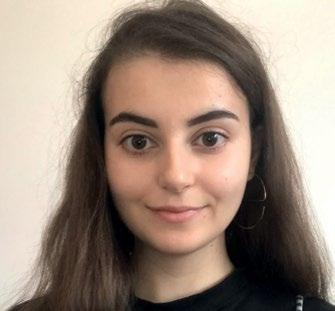
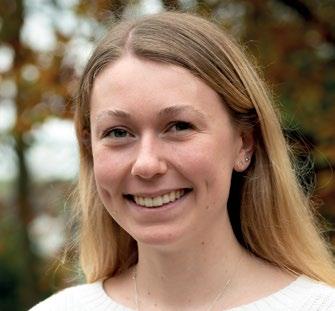
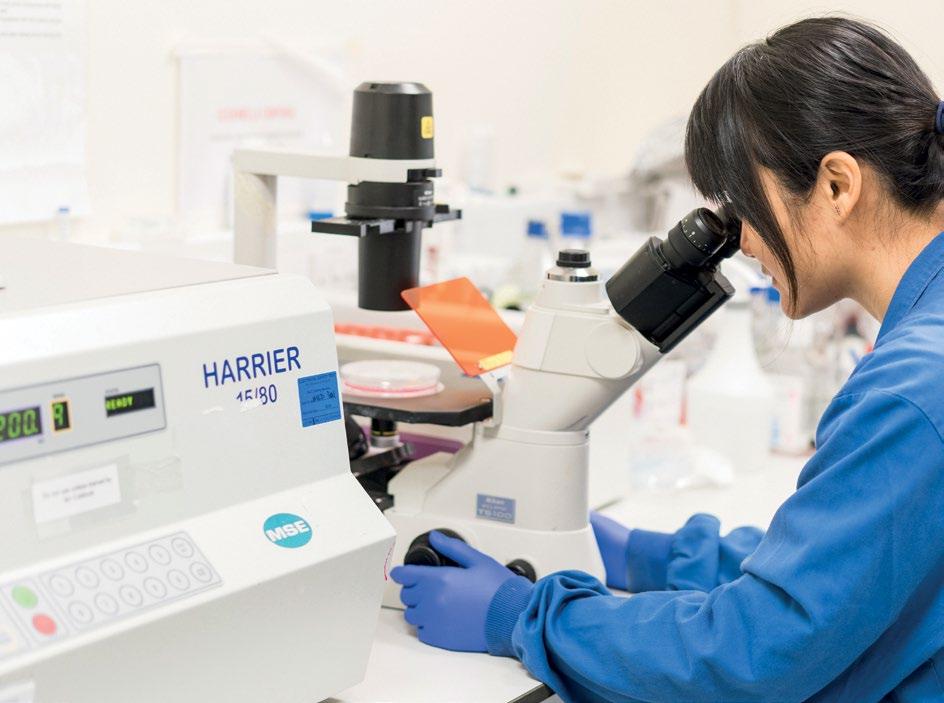
Some of our MND Association funded female PhD students directly involved with MND research include:
Natalie is a PhD student at the University of Sheffield. Natalie is investigating a mutation in the NEK1 gene which is found in some people living with MND. She aims to find out why this mutation causes MND and understand more about the processes it disrupts. This knowledge could be used to investigate ways to correct the damage and reveal potential targets for future treatments.
Libby Moody is a final year PhD student at the University of Sussex. Libby aims to further our understanding of pathways in the body which lead to the development of MND. She is specifically looking at whether microglia (immune cells in the brain) contribute to inflammation and subsequently MND by releasing molecules called microRNAs. Libby is investigating these microRNAs to find out if this could be prevented.
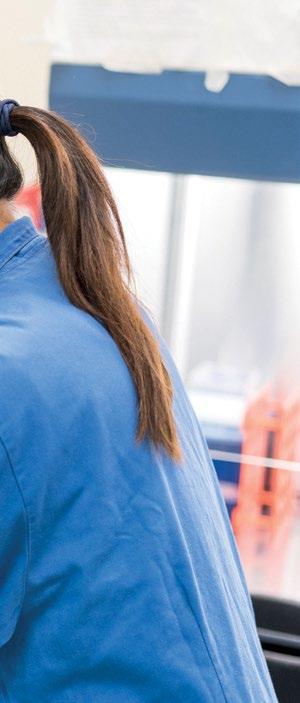
I would highly recommend finding a mentor who can help advise and guide you on how to be successful in the world of science and help you with problems outside of your work. I would also suggest you find what you are passionate about researching as it’s so important to love the work that you do.
Natalie PyeBe brave and never let anyone tell you science is not for girls. Find the right role models. Believe that you can be whoever you want to be, whether that’s a doctor, a scientist, a dancer, an artist, or an astronaut. Never allow anyone to convince you that you need to fit into a certain stereotype to pursue the career path you want.
Sara Tacconelli
The thing I love most about being a scientist is the fact that no two days are ever the same, so I never get bored of the work I am doing. Every day I learn so many new things and am challenged to think critically and solve problems. Obviously, there are days when experiments don’t work or things don’t go as planned, but that’s the nature of research! I always keep motivated by reminding myself that we are doing this research to work towards finding a cure for people living with MND, which is so incredibly important.
Libby MoodyMy favourite part about being a scientist is having the potential to find out things that no one else knows yet, and then being able to share that research with the world, with hope that it will help progress knowledge and treatments for currently incurable diseases.
Natalie PyeSara is a PhD student at King’s College London. Sara is investigating a protein called FUS, which can be faulty in some people living with MND. Her research focuses on understanding the role FUS has at the synapse, which is where information flows from one neurone to another. It is hoped this will increase our understanding of why particular biological mechanisms stop working in MND and potentially lead to new targets for therapeutic intervention. You can find out more about Natalie, Libby and Sara on our MND research blog: https://mndresearch.blog/
Throughout February, coinciding with International Day of Women and Girls in Science, we heard from talented female researchers and shone a spotlight on the invaluable role they play in MND research.
Our Royal Patron, HRH The Princess Royal joined a panel of top sportswomen at the latest event in the Association’s Insights series.
The Princess Royal, herself an Olympic gold medallist and prolific equestrian met people with and affected by MND as well as other invited guests at a reception hosted by the British Olympic Association (BOA).
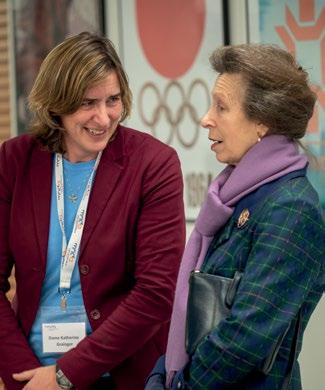
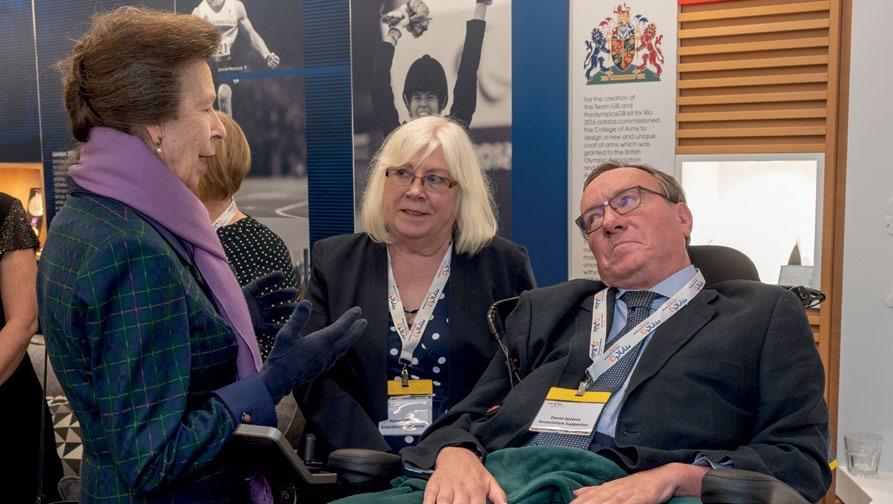
She then joined the audience to listen to a panel discussion chaired by BOA Vice-Chair and Co-Chair of the International Working Group (IWG) on Women & Sport, Annamarie Phelps CBE.
Taking part were Dame Katherine Grainger –Great Britain’s most decorated female Olympian, Anne Wafula Strike MBE – Paralympic wheelchair racer and Olympic weightlifter Emily Muskett.
The three women discussed challenges, triumphs and successes before taking questions from the audience.
The Princess Royal gave a speech before being thanked by Association trustee Katy Styles.
Katy said: “There’s not too many times in life when you get to introduce HRH The Princess Royal, Olympians and world class athletes to Association supporters and friends. Yet it was my honour to do so at this special event. It
was the first Insights event since the pandemic where we could all meet in person and not just online. The joy of this and the sense of a community sharing relaxed moments together was profound – a real ‘pinch yourself’ moment, me in a room full of powerful women and our MND family.”
There’s not too many times in life when you get to introduce HRH The Princess Royal, Olympians and world class athletes to Association supporters and friends. Yet it was my honour to do so at this special event.
Katy Styles, trusteeHRH The Princess Royal speaks with Dame Katherine Grainger Our Royal Patron, HRH The Princess Royal speaks with David Setters, who is living with MND, and his wife Helen
Seb Bousie has described a brand-new communication tool as 'priceless'.
Seb, who was diagnosed with MND in February 2019, now uses Project Relate –Google’s newest accessibility app which helps people living with the disease communicate better by transcribing their speech in real-time.
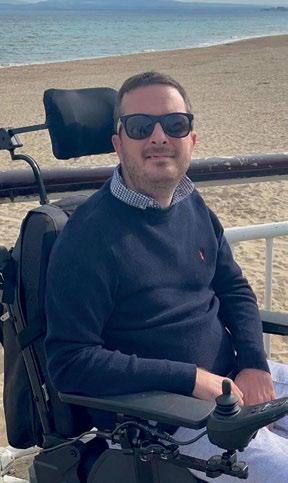
Using the app to communicate has restored some of Seb’s independence.
Seb says: “I have been using it for a few months and it’s been really good for me. It has given me the confidence to go out and be independent. If people don’t understand me, I can literally tell them within a few seconds what coffee I want to order for example. It’s been a big confidence booster for me.”
Launched last December, people with non-standard speech can teach Project Relate to understand their unique speech patterns, and communicate using three features:
Listen: which transcribes speech into text
Repeat: which repeats what is said in a clear voice
Assistant: which connects with Google
Assistant to help people get things done.
When Seb spoke to Thumb Print, he used the Repeat feature on his phone to re-enact a recent coffee order. It was repeated clearly in seconds.
He said: “This breaks down all barriers the disease has and allows me to communicate again and be more independent – that is a big thing. I was quite active and independent before MND. To have some of that restored is priceless.”
The app comes in particularly handy on occasions when Seb is tired, such as being out for evening meals. And he regularly uses it to communicate with his family at home.
He said: “I was introduced to it in January by Richard Cave (MND Speech and Language Therapist Project Manager at the Association). He came down to visit me at my home in Poole and we’ve been trying to find problems with the software ever since, but it’s pretty much perfect.”
Seb who regularly attends meetings of his local East Dorset and New Forest Branch said: “The most important thing
to me is my speech and my ability to communicate. I’m not at the point where I need eye-gaze technology, so while I have my speech I want to use it every day. Having the app means everything to me. It’s so easy to set up and use. I can’t recommend it highly enough.”
The MND Association, LifeArc and My Name’5 Doddie Foundation have jointly awarded £1 million to researchers at University College London (UCL) to progress research into potential cutting-edge therapies for MND.
The research grants are the first to be awarded as part of the £1.5 million MND Translational Fund. We kick-started the fund in 2021 with money from our patron Kevin Sinfield OBE's 7 in 7 Challenge.
The first project, led by Dr Pietro Fratta of UCL Queen Square Institute of Neurology and Dr Loic Roux of Nucleic Acid Therapy Accelerator (NATA), aims to develop a gene therapy to slow down, stop or reverse disease progression in amyotrophic lateral sclerosis (ALS) – the most common type of MND.
The second project, led by Dr Barney
Bryson and Professor Linda Greensmith of UCL Queen Square Institute of Neurology, aims to develop an innovative treatment to restore lost muscle function and prevent further muscle wastage in people living with MND. The project strategy involves injecting human stem cells into affected muscle to replace the lost motor neurones, with the potential to restore the controlled function of paralysed muscles.
Brian Dickie, Director of Research at the MND Association, said: “People with MND and their families consistently tell us that investing in research is their top priority, so we’re delighted to be able to channel funds from our supporters directly into these two exciting projects. We supported the initial scientific studies in the labs of Dr Fratta and Dr Bryson which have led to these new awards, and we are thrilled to see their discoveries being applied to
new, potential approaches to treatment. Our hope is that through collaboration, continuing public support and investing in cutting-edge therapies, we will find solutions to unpick the complex nature of MND and lead to an effective treatment.”
Dr Catriona Crombie, who leads LifeArc’s Philanthropic Fund which funds research to advance new treatments and tests for rare diseases, said: “Recent advances in our understanding of MND biology are opening up significant opportunities for new treatments. These research projects have a clear path for reaching the later stages of the drug development process, offering the hope of effective new treatments for this devastating condition.”
NHS Continuing Healthcare (CHC) is a care package arranged and funded by the NHS. The assessment is complex and can take a while to complete. Understanding how the system works, and what makes someone eligible for CHC, can make the process smoother.
To qualify for CHC, you must be assessed as having a ‘primary health need’. This usually means you have needs which cannot be met by adult social care services. You may get CHC if:
• You have complex needs which require a high level of skill to manage
• You need ongoing care
• Your condition is changing quickly and is causing concerns in managing your care.
This support can make a real difference to the care someone with MND receives, as well as their quality of life. The MND Association is currently working on a project focused on helping more people with MND to access CHC by increasing knowledge and awareness of CHC funding
and providing support throughout the process.
As a result, we have produced a new animation explaining:
• What CHC is and who qualifies
• What the different stages of the application process involve
• How to access this support
• How to appeal
• How to find out more.
The animation is available on our
This revised sheet offers guidance on using your own voice if you begin to get speech problems with MND or Kennedy’s disease. The content also covers the types of communication aid that can help. Find this sheet, and more about speech and communication at www.mndassociation. org/speech
Our comprehensive guide has been updated recently. No major changes were needed, but the current version is now available in print or on our website at www.mndassociation.org/lwmnd
Our web pages about MND and Kennedy’s disease have been updated. Find them all in the following web hubs: For guidance about MND or Kennedy’s disease: www.mndassociation.org/ about-mnd
To help manage daily life with MND: www. mndassociation.org/living-with-mnd
Find out about health and social care support at: www.mndassociation.org/ health-and-social-care
For unpaid carers or family members who support a person with MND: www.mndassociation.org/carers
For children, young people, parents and guardians in families affected by MND: www.mndassociation.org/cyp
Lists of all our published resources can be found at: www.mndassociation.org/ publications
We also offer resources to health and social care professionals, to help them provide tailored support. The following items have been updated:
• MND: a guide for GPs and primary care teams
• MND information for acute, urgent and emergency care
• P1 – Head supports for MND
See all of our resources including those for professionals and research at:
website, alongside our other animations at www.mndassociation.org/animations
We have also revised our publications on CHC.
For people with MND, our information sheet 10D – NHS Continuing Healthcare explains what CHC funding is for, the assessment process and the options available.
For health and social care professionals, information sheet P7 – NHS Continuing Healthcare for MND has been updated. It goes through each CHC domain in detail, and lays out how they may apply to MND. It aims to help assessors understand more about MND.
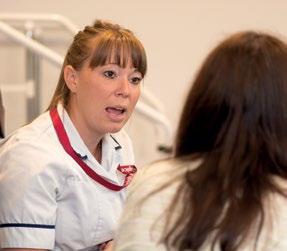
You can download our publications on our website at www. mndassociation.org/publications. Hard copies are available from our MND Connect helpline. Email mndconnect@mndassociation.org, or call 0808 802 6262.
www.mndassociation.org/publications or order printed copies from our MND Connect helpline: 0808 802 6262, mndconnect@mndassociation.org
Trusted Information CreatorOur information development is accredited through the PIF Tick scheme. This means our resources are evidenced, user tested and reviewed by experts.
Would you like to help with our information development?
We work alongside people with MND and Kennedy’s disease, and their carers, to develop and improve our information. We have lots of work ongoing in 2023. If you would like to get involved, you will have opportunities to feed into a range of different content and formats.
You can pick and choose which tasks you want to work on and make a difference from the comfort of your own home.
To find out more, contact: infofeedback@ mndassociation.org
The MND Association welcomed Tanya Curry as our new Chief Executive in January.
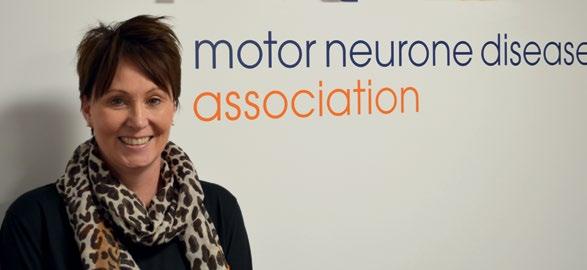
Tanya has more than 20 years’ experience in the voluntary sector, where she has held a number of senior clinical roles, including 12 years as a charity Chief Executive. She began her career as a registered nurse before becoming a clinical specialist in palliative care. She also has experience as a trustee and currently holds a non-executive role at Suffolk and North East Essex NHS Integrated Care Board. The editor of Thumb Print sat down with Tanya to hear her initial thoughts and talk about her plans for the future.
Q: You’ve talked about this being your dream job, why is that and how does it feel to be here?
A: I am absolutely delighted to be here, a job where you’re excited to get going every day and really make a difference. I have been afforded the opportunity to combine my clinical experience, including a background in palliative care, with my experience and love of charity leadership. Through working in palliative care, I have seen the impact an MND diagnosis has on people. It goes across every aspect of people’s lives and that’s why, together, we are working hard for better treatments and as our vision says, ultimately a world free from MND.
I feel hugely privileged to be able to lead our national charity, working with the board, our members, supporters, volunteers and staff to continue all the great work that is taking place to deliver our Promises.
Q: What was your first experience with MND in your career?
A: I had my first nursing leadership role at Farleigh Hospice in Chelmsford. The hospice ran support groups for people with MND, where they and their loved ones could come together for support, advice and care. We also offered similar services when I was Clinical Director and then CEO at St Clare Hospice in Harlow. I learnt how important it was to listen and learn from people who had this disease, and tailor services to what they really needed to help them live with such a debilitating condition.
Q: What was the most appealing thing about joining the MND Association?
A: I could really see what the Association was doing. The profile was being raised by our patrons Rob Burrow MBE and Kevin Sinfield OBE through the sharing of their own journeys, and the need for better treatments and ultimately a cure was clear to see. It was the combination of passion for the cause and my energy, drive and desire to make a real difference that all seemed to be aligning. I wanted to be part of the organisation’s journey. It has become much more apparent to the whole country the need for more in terms of MND research and the drive for effective treatments.
Q: What do you see as the Association’s best assets?
A: It’s all about people and relationships for me. I can’t teach people to have passion in the cause. I can’t teach them to be determined. What I can help them with is developing services, planning, having different conversations, working with new partners. And being brave to make bold decisions. Everybody I’ve met so far leaves me with no doubt why they’re here and the difference they’re trying to make. It is really heartwarming and gives me a great opportunity as the new Chief Executive to build on that for the next stage of our journey.
The MND community as a whole must be highlighted as a real asset for the Association. We have people letting us into their lives, helping us to understand their journey and the impact of this disease. This supports us in tailoring our work and services, quite simply we
could never do that without the MND community.
Q: What is your vision for the Association?
A: I’m in the early days at the moment. So it is about getting up to speed fully with where we are as a charity and understanding the detail behind our Promises. I am busy getting to know people, as well as trying to make a start in meeting members of our community, where I know I will learn so much. We’re ambitious and forward-thinking which is where we need to be.
We’ve got a high profile at the moment and I want to make sure we use that well and continue to engage people, while striving for a world free from MND. We must be brave and really push the organisation forward as it is ultimately what those people living with or who are affected by MND truly deserve.
Q: What part of your new role are you looking forward to the most?
A: There’s so much. At the moment it’s spending time meeting people and understanding their stories. Being able to really actively listen and understand what we can do to help is a crucial part of my fact finding. I’m really looking forward to working with the board and our Directors team – a really passionate group of people who, like me, are here to make a real difference and make sure our expertise and resources are focused in the right areas, in the right way. I want to understand how we come together, how we prioritise and how we challenge each other to make sure we make the right decisions to get the best out of the Association.
Our Act to Adapt campaign is launching in local target areas where councils do not have a fasttrack process and do not waive mean-testing for people living with MND who apply for Disabled Facilities Grants (DFGs).
Our most recent focus has been in Maidstone, found to have the second longest wait times in England for a DFG – an average completion time of 22 months.
Members of the Legislative Assembly (MLAs) gathered at Stormont on 24 January to hear recommendations on how to provide better care and greater support for people living with MND.

The event was sponsored by Colm Gildernew MLA, Deborah Erskine MLA, and Danny Donnelly MLA, and launched our latest report, The provision of care for people living with Motor Neurone Disease in Northern Ireland
The report sheds light on the lack of services available to people with MND in Northern Ireland and explains to MLAs what can be done to improve the situation.
Specifically, the report is calling for:
• The development of a Northern Ireland
MND Regional Care Network
• Support for unpaid family carers of people with MND
• Improved access to housing adaptations.
Attendees included people living with and affected by MND, the Northern Ireland Branch of our Association, as well as 12 MLAs.
All had the opportunity to hear firsthand from people living with and affected by MND about their experiences accessing the health and social care services they require.
Head of Regional Care Partnerships at the MND Association, Clare-Anne Magee, spoke to BBC News Northern Ireland to highlight the need for a Northern Ireland MND Regional Care Network to provide more community-based support for those living with MND. She stressed the provision of multidisciplinary care locally would mean individuals affected wouldn’t have to travel as far to receive vital care and support.
It was also found that Maidstone Borough Council significantly underspent its DFG budget and has no formal fast-track or meanstesting process in place for the DFG application process.
After meetings with Association volunteers, we encouraged Councillor Simon Webb to meet with the Housing Manager for Maidstone. This led to council policy being rewritten to reflect the immediate and urgent needs of people with MND. Simon made it clear at the time they expect a fast-track process to be included.
The policy changes at Maidstone Borough Council were agreed by its Executive Committee and will now go to Full Council before the end of April for formal adoption. We hope to see similar progress in other areas.
Our Act to Adapt campaign is calling on councils to use their discretionary powers to ensure they are meeting the needs of people living with MND in relation to accessible housing. This may include:
• Introducing a fast-track process for people with MND
• Removing financial assessments for Disabled Facilities Grants under £5,000 for people with MND.
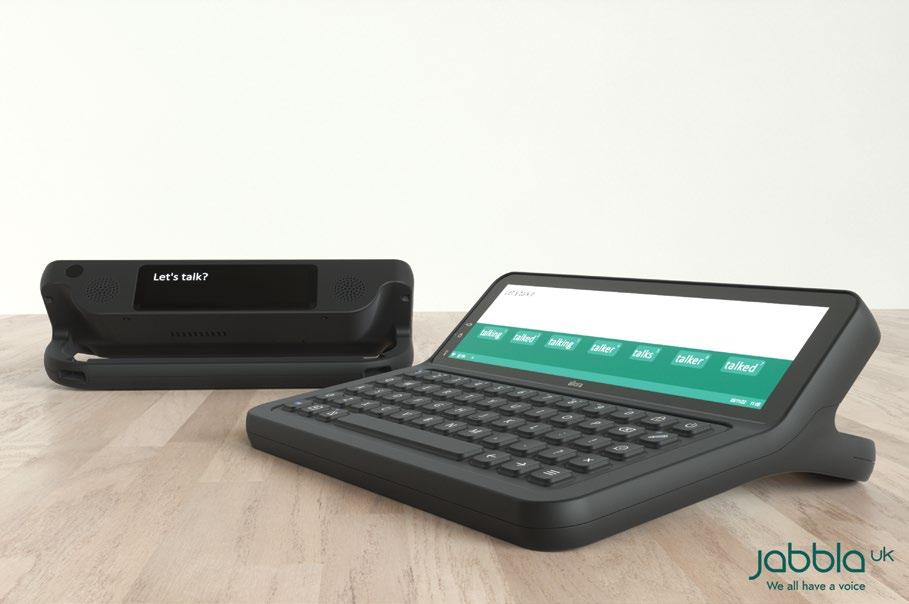







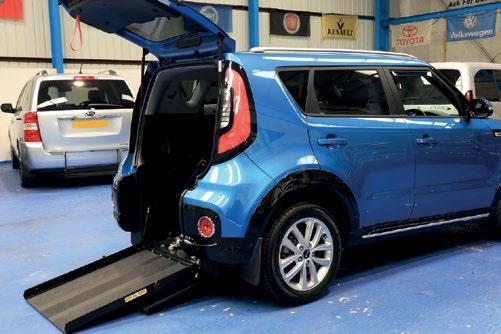




Garry Smith’s epic fundraising efforts have seen him head to the Arctic Circle to raise awareness of MND.
Last year, Garry took part in a number of running events, travelling all across Europe. This included the Polar Night Half Marathon in the city of Tromsoya, 400km north of the Arctic Circle where temperatures average -17°C.
Garry is running in memory of his wife Jan who died from MND.
He says: “Doing the challenges for Jan, it’s like she’s travelling with me and has given me the confidence to make these trips. Jan is always at the forefront of my thoughts as I complete each challenge and when I’m struggling on an event, I think of the struggle she had to go through each day and that gives me the strength to go on.”
Garry has even more events planned for 2023, including stops in Portugal and France, as well as taking part in the Rob Burrow Leeds Marathon in May. He aims to continue fundraising and raising awareness to help find a cure.
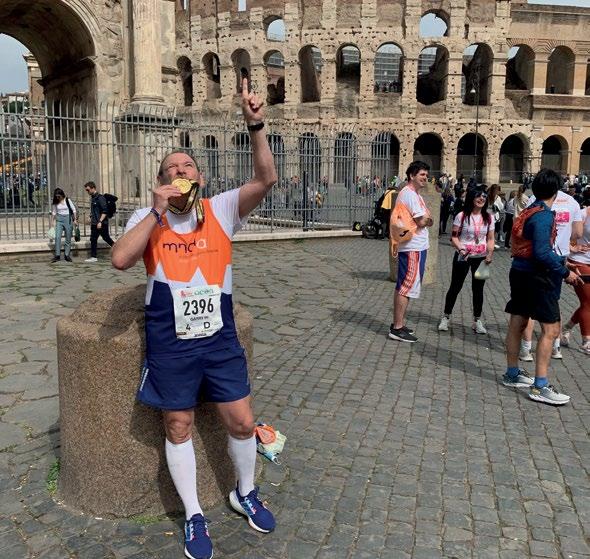
Garry said: “I will always raise awareness and funds for the MND Association because the disease has made such a devastating impact on our happy little family.”
Sarah Roscoe has completed the daunting 388km-long Dragon’s Back Race to raise funds and awareness of MND.
Sarah completed the six-day race across
multiple mountains from north Wales to south Wales last September with a running time of 81 hours, having climbed 18,496 metres. She raised £1,900 for our South Yorkshire Branch.
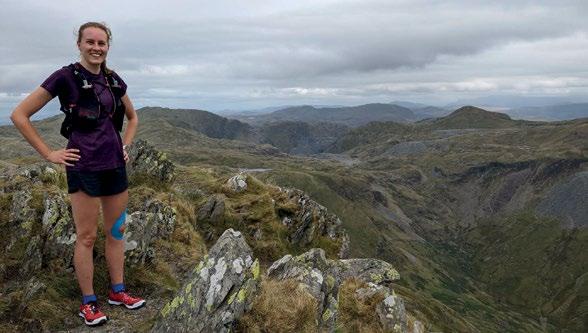
Sarah said: “Each day on the Dragon’s Back course has its own character: from the rocky summits of Snowdonia; the rolling and ankle-twisting bogs and tussocks of mid-Wales; into the steep, grassy slopes of the Brecon Beacons; and finally, the urban trails of Cardiff.”
Sarah's training in the Peak District stood her in good stead, though the demanding race saw her running for between 11 and 15 and a half hours each day.
She said: “I am incredibly proud of what I achieved, and exceptionally grateful to my body for enabling me to take on such a ridiculous challenge. But most of all, I am honoured that I was able to make even a small difference to people living with MND. I have had the pleasure to meet and work with some wonderful people living with MND, and I know how much difference fundraising makes to their lives and the lives of their families.”
Doing the challenges for Jan, it’s like she’s travelling with me and has given me the confidence to make these trips.Sarah Roscoe during the Dragon’s Back Race
It was 10 years ago that Eddie Redmayne was cast in The Theory of Everything and committed to embodying the physical and emotional complexities of Dr Stephen Hawking.
Yet while he’s transformed himself in nearly a dozen projects since, the role hasn’t left him.
By the time he met the iconic genius in 2013, Eddie had already spent months quietly immersing himself in the cruelties of everyday life with MND, through the guidance of the MND Association. Key in Eddie’s research was Glenn Phillips (who died from MND) whom he met at a clinic and visited at his home in Watford.
Eddie said: “Glenn was just a brilliantly charismatic man — a passionate cinephile. He was also very open with me about the horrid tolls of the disease. He lived alone, and I remember visiting his house on a sweltering day. His doors were open to let in the air but covered with fly nets. I remember him being very concerned about keeping the fly nets in place. He reminded me that with MND you feel everything, but there were parts of his body he was unable to move. So if a fly or a wasp landed on him he had no way of shooing it off. It was a specific but horrible detail of living with the disease.”
The film was released in 2014 and Eddie’s career, already on the ascent, soared as he swept every major acting prize, including an Oscar. But it wasn’t only awards and acclaim that had changed his life.
In 2015, he eagerly became a patron of the MND Association to help heighten awareness of our research and support for people living with MND.
“It is a disease that I saw in all its detail and brutality, and those people I met and their courage had a profound, lasting impact on me,” he said.
Since then, Eddie has spoken publicly about MND, appeared at events, shivered through ice bucket challenges and lent his presence to public awareness projects.
Jemma Temple, our Head of VIP Liaison and Events, said: “Eddie’s support makes a huge difference. He does so much behind the scenes. It’s clear the MND community has a firm place in his heart.”
Eddie returned to visit Glenn Phillips to show him his Oscar and thank Glenn
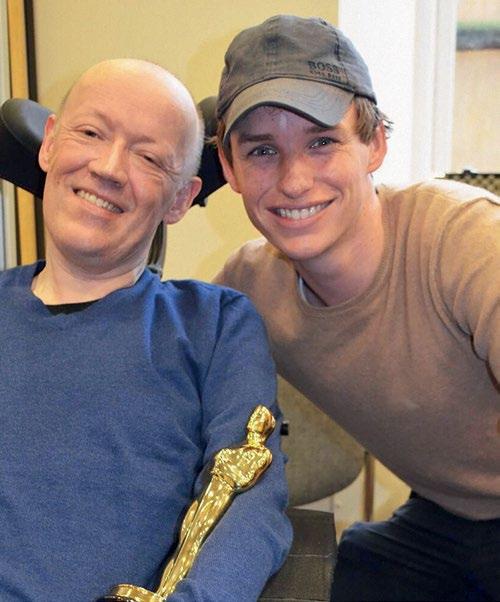
for helping shape his performance. His connection to the Hawking family endured, too. Eddie wrote the foreword to Stephen’s final book, Brief Answers to the Big Questions, and read a passage at the Professor’s funeral in Cambridge in 2018.
During the height of the Covid-19 pandemic, Eddie became involved with the MND Association on a different level, helping to create awareness among Members of Parliament about the special needs of patients.
“The people who run the MND Association are brilliant and I have long offered my support to them. During the pandemic, I was astonished to hear that people living with MND were not automatically placed on the ‘most vulnerable’ list,” he explains. “It felt important to me to hear the discussion and witness the response from the politicians when challenged on this.”
Each year for Eddie’s birthday on January 6, he gives his blessing (and a generous
contribution) to a campaign organised by fans supporting his role as our patron. The drives have raised more than £50,000 and this year’s was in the top 1% of JustGiving fundraisers for the month of January.
Tanya Curry, our Chief Executive, said: “The awareness Eddie brings to our work is invaluable, going above and beyond for us, such as with personal donations.”
Eddie remains determined to keep MND in the public eye. “There are many extraordinary causes out there in the world vying for the attention and compassion of the public, looking for their support,” he said. “Because statistically MND affects a smaller proportion of the population than some other diseases, investment in research and finding a cure can be less forthcoming.
“From my personal experience, having spent time with Stephen, Glenn, and a host of families, researchers, and specialists in the field, it will always be a cause that I put my support behind.”
It is a disease that I saw in all its detail and brutality, and those people I met and their courage had a profound, lasting impact on me.
Eddie Redmayne
After retiring as a headteacher, Nigel Hazell loved nothing more than going out and about, taking photos with his camera.
But after he was diagnosed with MND in September 2021, handling ’drainpipesized’ telephoto lenses for close up shots became harder to manage.
Nigel initially invested in lighter equipment which was easier to use, but something was missing.
Fast forward to now and a new mobility scooter, supported by a grant from the MND Association, has helped Nigel rediscover his passion for photography.
He said: “Life at full tilt was what really excited my photographic mind. A few years on, moving slowly on four wheels has truly reinvigorated my love of photography.”
Following his diagnosis, Nigel moved into a single storey house in Leicestershire to be closer to his children. Shortly afterwards he met Erica Littleworth, an MND Care Co-ordinator at Nottingham MND Care Centre.
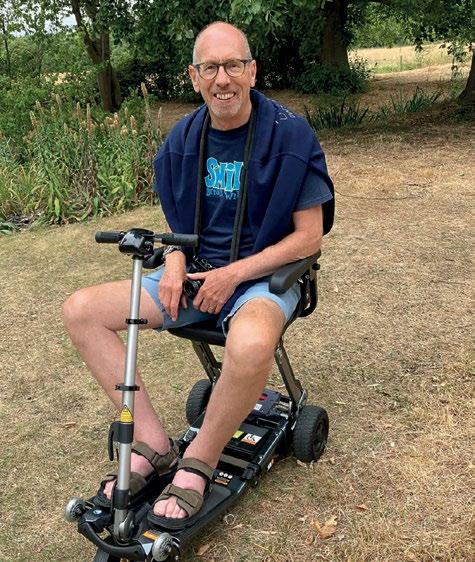
Erica applied for an Association grant on Nigel’s behalf to help towards the cost of his scooter.
Nigel said: “A few weeks later, after my new wheels arrived, the creative smiles were reappearing on my face. It was so much easier to trundle around looking for images to shoot.”
Last October, Nigel and his wife, Liz, took a break on the Suffolk coast. As always, he took his camera with him.
He said: “Riding along the front in Aldeburgh, I was delighted to see my
first picture of the day. Someone wearing tartan trousers was painting a wall purple. Some purple in the tartan worked beautifully with the colour of the freshly painted wall. At that moment, I decided that my project for the break would be all about colour. My ability to get about easily on the scooter was brilliant and soon I was finding image after image, meeting my
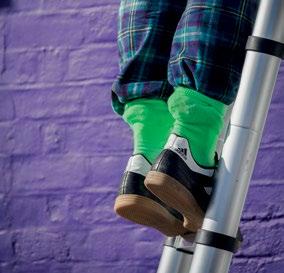
self-imposed brief.”
One of the images Nigel captured became an award-winner.
He said: “I had been searching for something abstract for a themed competition. A few tweaks in Photoshop and my entry, Magenta Shadows was posted. I was delighted to find out this picture had received a Commended award. For the first time in a year, I was enjoying my hobby again and my mojo was back.”

Using 60 images taken during his Suffolk break, Nigel put together a presentation entitled Coastal Colours, soundtracked with She’s a Rainbow by the Rolling Stones, which he presented to Wakefield Camera Club last November.
He has since won another competition and is now helping a fellow photographer with a distinction panel for the Royal Photographic Society.
Nigel said: “Thank you so much to the MND Association for allowing me to get excited about my photography again.”
A few weeks later, after my new wheels arrived, the creative smiles were reappearing on my face. It was so much easier to trundle around looking for images to shoot.
Association patrons, Rob Burrow MBE and Kevin Sinfield OBE have been awarded the highest civic honour, Freedom of the City of Leeds, by the city they proudly represented for so many years.
The new freemen of Leeds were honoured at a ceremony in January to recognise their heroic campaigning and fundraising for everyone affected by MND.
The leader of Leeds City Council, Councillor James Lewis, said: “Rob and Kevin embody the very best of Leeds, so
it is our pleasure and our privilege to have been able to recognise their achievements with the freedom of the city. They have made an incredible difference to many, many lives over the last few years and together provide an inspirational example of how friendship and generosity can endure during even the toughest of times.”
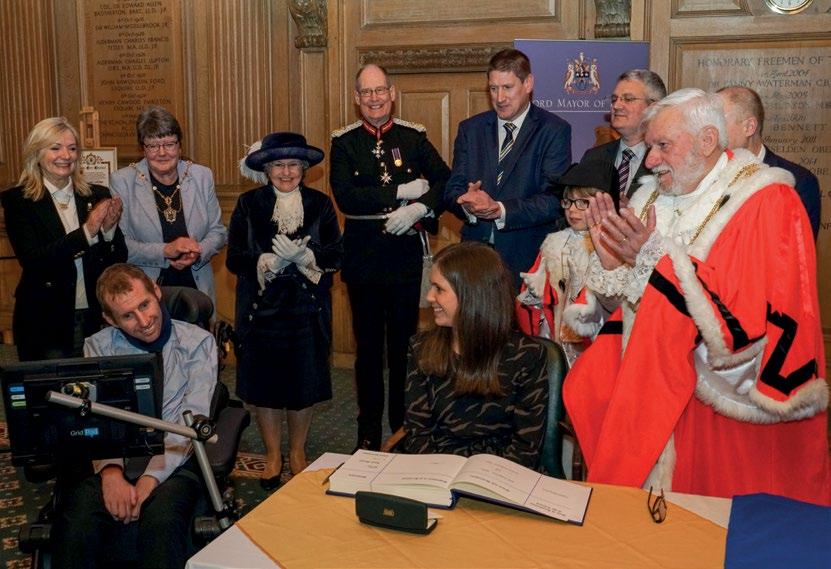
Rob, who was joined by wife Lindsey and their family at the ceremony, said:
“It feels amazing to get the Freedom of the City of Leeds – I am honoured to get this award. I am blown away by the
Television viewers were treated to behind the scenes footage of our patron Kevin Sinfield's trilogy of challenges in not one, but two documentaries.
BBC Breakfast cameras followed Kevin from the first day of his 7 in 7 Challenge in November 2020 to his triumphant walk onto the pitch at Old Trafford on day seven of his Ultra 7 in 7 Challenge last November. The production team edited hours of
footage to produce Kevin Sinfield: Going The Extra Mile which aired in February.
The moving documentary included interviews featuring people with MND who supported Kevin’s epic journey, together with exclusive footage and commentary from Kevin. Also appearing was Rob Burrow, whose battle with MND inspired Kevin to raise funds and awareness for MND charities. Just two weeks later, Sky Sports Arena showcased RAM Films’ documentary
support of Leeds, both as a Rhino and since I got news of my diagnosis.
“Leeds as a city shows it cares just by people stopping to ask how I feel. To the guys who fundraise, to the guys shoving money in my pocket towards the centre in Leeds, they all mean the same – people of Leeds take a bow.”
The title’s previous recipients include Sir Winston Churchill, Nelson Mandela, Alan Bennett and members of the famed Leeds United side of the 1960s and 1970s.
The 90-minute film, shot during Kevin’s final challenge, had its red carpet premiere in front of an audience of invited guests, including people with MND, supporters and volunteers from the MND Association, in Leeds in January.
It was then given its televisual debut, aptly during the warm up programming for the Leeds Rhinos game at Warrington Wolves’ Halliwell Jones Stadium.
Leeds as a city shows it cares just by people stopping to ask how I feel.
To the guys who fundraise, to the guys shoving money in my pocket towards the centre in Leeds, they all mean the same – people of Leeds take a bow.
Rob Burrow MBE
The MND Association has moved to the next level of the Disability Confident-Employer scheme, in recognition of our practical and awareness raising work around disability.
We have two network groups open to people with MND, people affected by MND, volunteers and staff. One is for our LGBTQIA+ community (our Pride network group) and the other for our BAME community (our DEEM - Diversity, Equity, Ethnic, Minorities - network group). Do drop either of the groups a line if you would like to find out more: pride@mndassociation.org and DEEM@ mndassociation.org.
This year we will be reviewing the accessibility and inclusivity of all of our public facing products and services in particular MND Connect, information on both care and research, as well as volunteer recruitment. If you spot anything you feel is difficult to use or find please drop our Head of Inclusion and Wellbeing a line: john.gillies@mndassociation.org
Over the past three years, we have been able to bring people with and affected by MND together in virtual support groups, which has helped to remove some of the barriers presented by in-person meetings.
We’re now extending that offer by trialling language specific support groups, providing peer support to people in their preferred language.
Our DEEM network is launching the first group, aimed at Hindi
As always, I am pleased to be asked to contribute to Thumb Print, knowing of its importance to the MND community. Firstly, I’d like to pay tribute to my
speaking people with MND and their families. The group will run for a three-month trial period, with the first meeting on 26 April at 11am. For more information and joining details, please email ahmed.abdeldayem@mndassociation.org or call MND Connect on 0808 802 6262 and ask about speaking to us in Hindi.
predecessor as Chair of the Board of Trustees, Richard Coleman, who sadly died in January. Richard guided the Board in an exemplary manner and will be very much missed. Members from his local Chiltern Branch together with staff from the Association joined me at his memorial service in February to hear his family speak of how much the Association meant to him and to them. You can read more about Richard and his work on page 35.
On a brighter note, I am very much looking forward to attending our first in-person Annual Conference and Annual General Meeting (AGM) since the pandemic on Saturday 1 July in Leicester. The event provides an opportunity to meet as a community, share our experiences and hear about what we’ve achieved as an Association in the last year.
Elsewhere, trustees continue to engage
with our membership, which included attendance at the latest Insights event where our Royal Patron, HRH The Princess Royal joined a panel of top sportswomen. You can read more about this on page 6.
My fellow trustees and I are also looking forward to attending the Rob Burrow Leeds Marathon on Sunday 14 May. It is always an honour and a privilege for us as trustees to meet people across the MND community and hear first-hand their experiences of living with the disease.
On behalf of the Board, thank you for everything you are doing for the MND community and our Association. We simply couldn’t achieve what we do without your support.
Together, we will beat MND.
Dr Usman Khan Chair of the Board of Trustees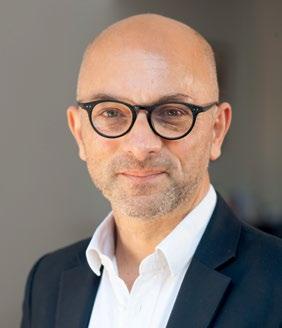
Nearly 900 people living with MND have been added to the MND Register in the last year.
As of last October, 4,960 participants had been registered, up from 3,791 the previous October.
Our MND Community Research Advisory Network (CRAN) is recruiting new members.
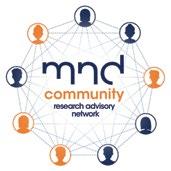
The network plays a key role in shaping the future of our research commitment and is open to people with an interest in MND research.
The first 22 members – early career researchers, senior researchers and people affected by MND – signed up at our MND EnCouRage UK event last July. And now we’re looking for more people affected by MND to join.
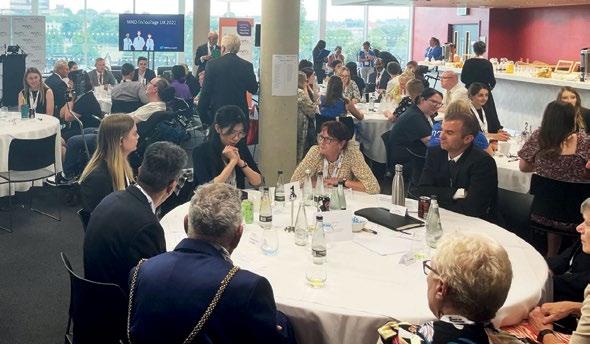
Mandy Spencer, Research Engagement Officer, said: “Everyone’s unique experience gives them a different view of research – from what priorities could be, to the way we present information, to the way we talk about it to others. We’re keen to harness all of that experience to shape the way we work.”
• People with MND
• Carers and family
• Researchers
• Clinicians
• Other healthcare professionals
• Anyone with an interest in MND research
• Working with external stakeholders to develop research studies and projects that will provide maximum benefit to the MND community.
• Reviewing existing research information, advising on content and accessibility, finding new ways of communicating information and identifying gaps in our existing content.
• Developing a series of educational and informative webinars, videos, podcasts and workshops on topics of interest to the MND community.
• Finding ways to include groups that are less often seen or heard.
• Developing new opportunities to engage with researchers.
• Presenting MND research to interested groups.
There is no expectation of commitment – you can do as much or as little as you like. Opportunities are accessible for everyone and training and ongoing support is available.
If you would like to know more about this exciting opportunity, please email mndcran@ mndassociation.org or find out more on our website www. mndassociation.org/research/getinvolved-in-research/mnd-cran/
The MND Register aims to capture information on every individual with MND in England, Wales and Northern Ireland to inform research and help shape care and support – both now and into the future.
For instance, pinpointing geographical areas with a concentration of people with MND demonstrates a need for more specialist healthcare. Anonymised datasets from the Register are provided to MND researchers for use in research into the causes of the disease and potential treatments.
Currently, there are 42 sites actively enrolling people onto the MND Register. This includes the 22 MND Association funded Care Centres and Networks, 18 neurology clinics and two hospices. A further 11 sites are scheduled to join the MND Register network in 2023.
Current information gathered represents an area of 22 million people, around 35% of the adult population of England, Wales and Northern Ireland. The aim is to reach 100%.
The team is now developing a telemedicine app (TiM), which will eventually be rolled out to all participating sites. By signing up, people living with MND will have more opportunities to take part in research, for example by completing questionnaires remotely.
Once fully rolled out, TiM will become a gateway to research and trial participation.
Thank you to everyone who has participated in the MND Register. If you would like to find out more about the MND Register, visit www.mndassociation.org/mndregister
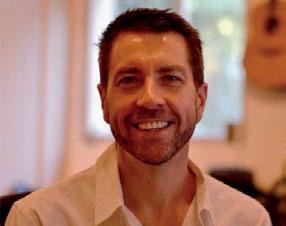
Last year, we asked for your feedback about our financial grants programme as part of an evaluation of our service.
The evaluation assessed the effectiveness, reach and impact of our current grants.
We collaborated with nearly 600 people including people living with and affected by MND, branch and group volunteers and health and social care professionals.
We received moving feedback about the impact of our grants, with families affected by MND saying grants helped them to feel supported, gave them a renewed purpose and helped to make special memories.
With the help of a grant, Anne Helliwell visited Versailles in France – a ‘long held desire’ of hers. Anne, who has been living with MND since May 2019, was joined on the trip by her husband Phil and her two sisters, Maureen and Gabrielle.
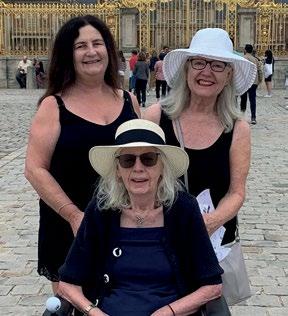
Phil said: “Being able to holiday together and accompanied by close family is heartwarming, comforting and reassuring.”
John Cooper received a support care grant towards a riser/recliner chair.
He said: “This a game changer for me. It enables me to get out of my chair unaided and walk around my home, saving my wife Margaret extra duties. It also reclines when required, so I can have
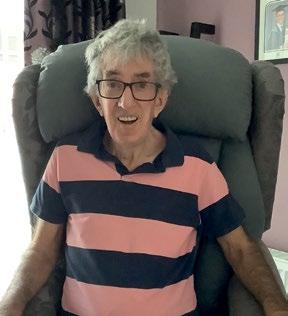
a quick cat nap at the press of a button. It certainly is a godsend and once again thank you to you all.”
We’re pleased that 92% of people living with MND who responded to our survey thought the application process was straightforward.
You also told us how we could improve our support, so here’s how we are planning to make it even better:
• Raise awareness of our grants programme. We learned some people didn’t know the Association offered grants, so we will do more to raise the profile of this support and help more
The beginning of this year saw us launch a new Cost of Living Support Fund to help people living with MND with increased household bills and food shopping costs.
At the time of going to print, 334 people living with MND had received £115,900 in Cost of Living Support Funds.
Steven Williams is one of those we helped. He was given £350 towards his soaring energy bills. Steven, who was diagnosed with MND in January 2017, said: “This has made a huge difference as money is so tight these days. Without this help, we would be in further debt to the energy company. The main issue is that bills remain high, but I am no longer earning. I am happy with the financial support you have given me and can’t thank you enough for that.”
More details about the Cost of Living Support Fund and how to apply can be found online at: www.mndassociation. org/financialsupport
The Darby Rimmer MND Foundation’s most recent donation of £50,000 is now being used to part-fund support care grants for riser/recliner chairs for people living with MND, and towards children and young person’s grants for those aged 18 and under whose parent, or a person they live with, has MND.
We also received an amazing £100,000 from the My Name’5 Doddie Foundation to part-fund support care grants towards adaptations, stairlifts, washer dryer toilets and quality of life grants as well as
people affected by MND.
• Improve guidance about the application process, including updating our grant application form and the information on our website.
• Consider retrospective funding for some applications.
• Regular review of grant limits and categories.
We will keep you updated with our progress on our dedicated webpage: www.mndassociation. org/supportgrantreview
carers and young carers grants for home and garden improvements and holidays. We are very grateful for the incredible support from all of our funders and also the support from our dedicated branches and groups towards our financial grants programme.
“I
The MND Association has secured new NHS partnership funding for our South West Peninsula MND Care Network enabling an expansion of services.
Both NHS Devon and NHS Cornwall and Isles of Scilly began contributing as equal partners from November.
The agreement, secured for a year initially, will see the introduction of a new MND Care Co-ordinator and an Administrator. It will also give people living with MND the opportunity to take part in research trials closer to home.
Tracy Thomas is the Lead Co-ordinator for the South West Peninsula MND Care Network and has been working with people with MND for more than 30 years.
Tracy said: “When we get a referral for a new patient, we go and see them at home and talk about everything. Now we can explain we are a research network as well as a care network and we have trials running in both areas they may be suitable for.”
The South West Peninsula MND Care Network’s philosophy is people with MND should receive care in their home or as close to home as possible.
Tracy said: “Being able to see people in their own homes (or close to home) when a problem crops up is the key thing. Knowing there’s a specialist you can ring and say, ‘I really need you to come and see me and help me with this’ and that is what patients say is the biggest benefit. As we keep in touch with people very regularly, we can see problems looming and proactively do something to stop them from happening.
“All of our services are either done at home or close to home. The new NHS partnership means we can work more collaboratively, which is vital.”
We were sad to learn of the death of Richard Coleman, our former Chair of the Board of Trustees, in January.
Having joined the local Chiltern Branch after his wife, Jo, was diagnosed with MND in 2005, Richard took over as Branch Chair in 2006 shortly after Jo’s death.
Richard became a trustee for the MND Association in 2011, and was elected Chair in 2018, a post he held until last June.
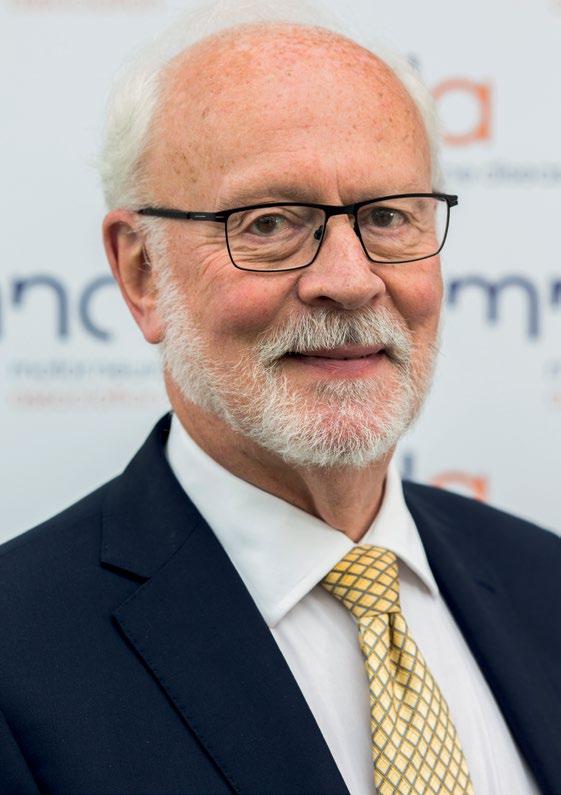
Richard led the Association through a period of change and growth. He was passionate about research and worked tirelessly on campaigns aimed at securing better funding and raising awareness of the needs of families affected by MND.
At branch level, Richard was a proactive Chair – leading meetings and
playing a key role in many fundraising events. The Chiltern Branch described him as ’very approachable – always calm, reassuring and available to listen and offer sound advice to any of the volunteer team’.
Richard also enjoyed monthly quizzes in aid of the Branch held at the White Lion pub in Cryers Hill. He was a key member of the Branch’s team, the Chiltern Challengers, before taking on the role of quizmaster.
The MND Association sent a message of condolence to Richard’s sons – Nick, Dom and Tim.
The Chiltern Branch has arranged for a book of condolence to be presented to his family. If you would like to sign the book, please email chiltern@ mndassociation.org
When we get a referral for a new patient, we go and see them at home and talk about everything.
A family fun day organised by the MND Association Children and Young People’s service and the North Lancashire and South Cumbria support group provided the perfect opportunity for families affected by MND to meet, share time together and create long-lasting memories.
Throughout the day at Bendrigg Lodge in Kendal, families enjoyed activities including face painting, climbing and a sensory swing.
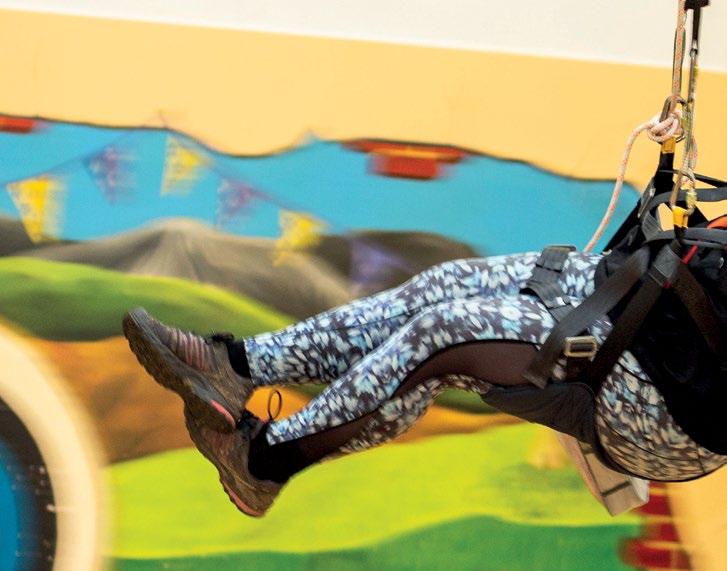
They were also able to share their experiences of MND with each other.
Catriona Bamber, a Family Support Worker based at the Lancashire and South Cumbria MND Care Centre, said: “We wanted to give families the chance to have fun and try to step away from MND for the day.”
Rob Abraham, who is living with MND, brought his wife Sarah and their sons – Theo and Freddie.
Rob, 41, was diagnosed with MND in February 2022. He said: “MND has affected me from the shoulders down so there are lots of things I physically can’t do. But in the same way, mentally I actually find it better as I can still speak and my mind is fine so I can still have that interaction with my family. It’s better to think about what I can do, rather than what I can’t.”
Rob also said he and his family appreciated the chance to meet with others in the same situation.
He said: “It’s been amazing. It was great to
meet the other families, as well as people I know from the MND Association in a relaxing way instead of a formal appointment.”
Rob has received grant support from the MND Association and now uses a wheelchair. Last year he organised a clay pigeon shooting fundraiser which raised more than £8,000, split between the Association and Alder Hey Children’s Hospital.
Michelle Warburton, whose mother Debbie has been living with MND for a year, had fun with her son, Charlie and daughter Holly. She said the day gave her children the benefit of seeing they aren’t the only family affected by MND.
Michelle said: “We are still hopeful of finding more things we can do together as a family, like this, that Mum can still be involved in. Life still goes on, so live it – there are still lots of things on offer. Initially, the MND diagnosis on a person you love, the head of the family, takes your breath away. But the team from the MND Association around my mum have been tremendous. You always feel like you’ve got someone to turn to.”
Michelle and her family have also been learning sign language together so they can continue to interact with Debbie.
We would also like to thank the James Milner Foundation for its funding support for the family fun day.

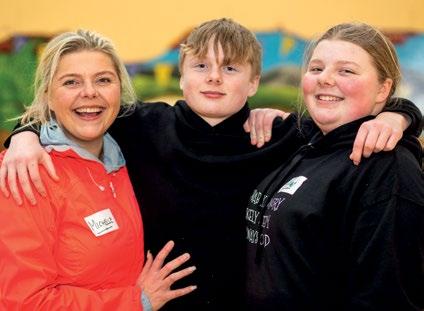
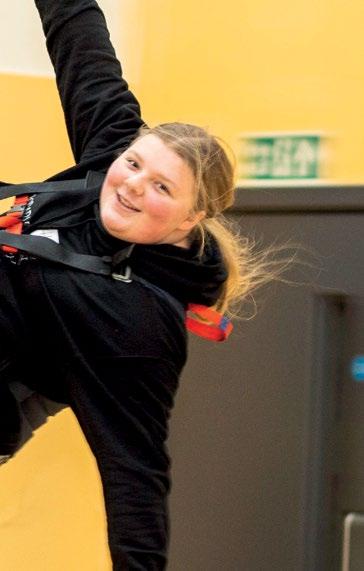
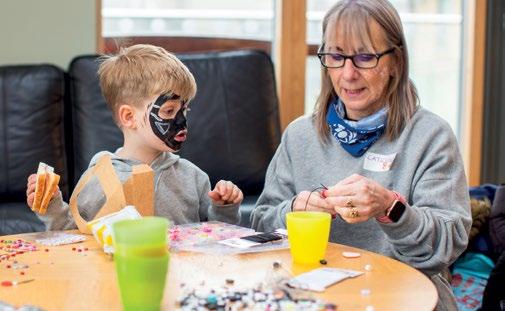
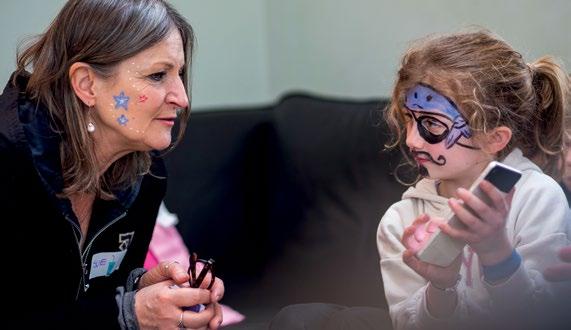
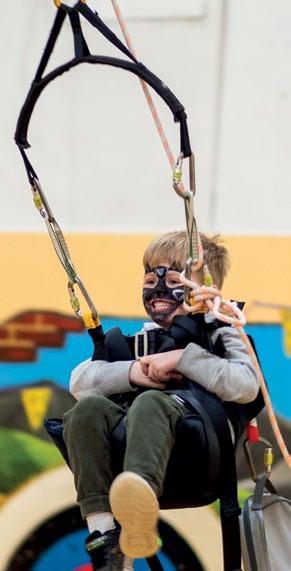
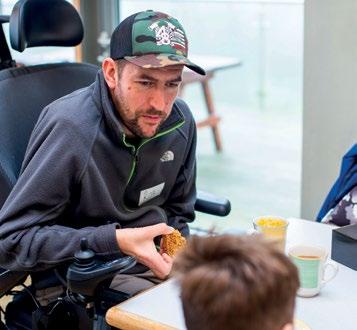
It’s been amazing. It was great to meet the other families, as well as people I know from the MND Association in a relaxing way instead of a formal appointment.
Rob Abraham, who is living with MNDFamilies affected by MND enjoy activities including face painting, climbing and a sensory swing at the family fun day in Kendal
We are delighted to invite you to attend our 2023 Annual Conference – and the choice to join in person or virtually is entirely yours.
The Annual Conference and Annual General Meeting (AGM) will take place on Saturday 1 July at the Leicester Marriott Hotel from 10am until 4pm.

The event gives you the opportunity to hear about the latest science, collaborations and innovations from our experts, and to shape the future of the MND Association by voting on resolutions.
There will be updates on translational research – or how new scientific discoveries can accelerate drug discovery and development, and technology initiatives being developed by our NextGen Think Tank partners to improve the quality of life for people living with MND.
Staff from across the MND Association, including our new Chief Executive Tanya Curry, will be on hand to say hello and they will be joined by trustees, including our
Chair of the Board Usman Khan who took up the post last summer.
There will also be a selection of carefully chosen trade stands offering guidance on resources and support available.
After a buffet lunch, the formal business of the AGM will take place with a report on our financial position, the chance to vote on resolutions and an introduction to our newly-elected trustee.
While this is the first time we’ve had
joining online and we are pleased to be able to offer this option.
Further details on how to register and reserve your place either in person or online, together with accommodation information, will be sent to all members in the coming weeks.
If you require any further information regarding the Annual Conference and AGM, please contact the Conference and Events Team conference@mndassociation.
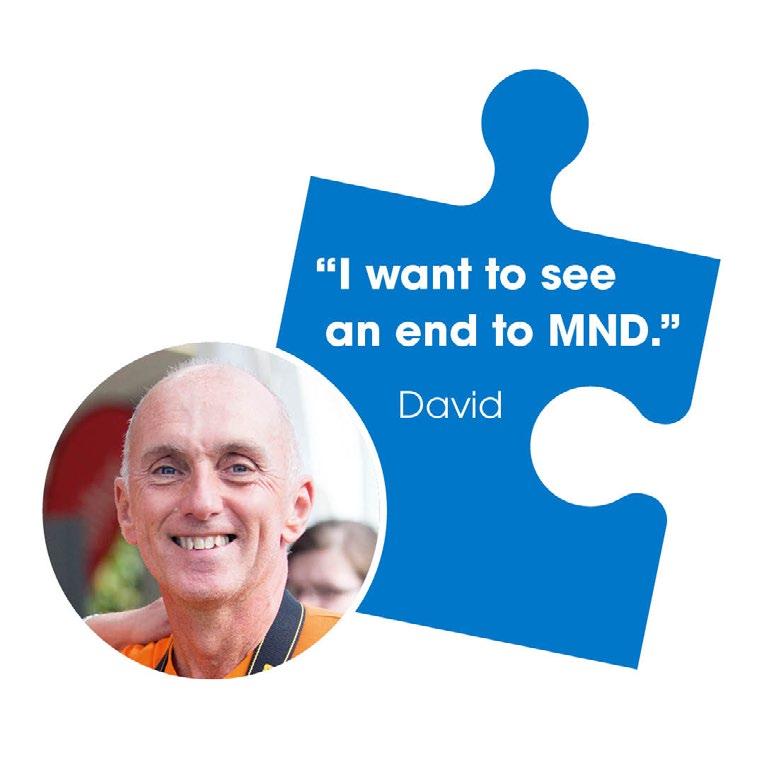
David
"I'm leaving a gift in my Will because I want to see an end to MND."
We have more than 7,000 volunteers across England, Wales and Northern Ireland. They give their time to provide support, raise funds and campaign to make a difference to people affected by MND.
All have their own reason for getting involved. For many, it is because someone close to them was diagnosed with MND and they want to make a difference to others who have been through a similar experience. That’s exactly why Wynter Yeomans chose to become an Association visitor (AV).
Wynter said: “As a student during Covid, I had a lot of free time and after losing a family member that year, I wanted to do something to make a direct difference and
that involved building relationships. This role has done exactly that and brought me into an amazing community all about people empowerment.
“My Association visitor role includes me providing emotional support and signposting to information and guidance. I tailor support to individuals and their families. Each visit to a person with MND varies and involves a range of skills, but most importantly I am someone they can confide in and communicate at ease with.
“Due to the nature of MND it is essential that we work together to ensure families and individuals can continue to live as full a life as possible.”
Aside from volunteering as an Association visitor, there are many
A quiz held in Maidenhead last October in memory of Chiltern Branch member, John Smith, raised £1,300.
John's wife Lizzie chose to organise the quiz in his honour after he died from MND in December 2021.
During the Covid-19 lockdown, the couple remained active with the Branch by taking part in weekly online quizzes which they regularly won. The Chiltern Branch team was one of 16 to take part in
Lizzie's quiz.
Lizzie presented the cheque for £1,300 to the Branch’s Vice Chair and John’s Association visitor, Carmel Grant, at a recent support group meeting.
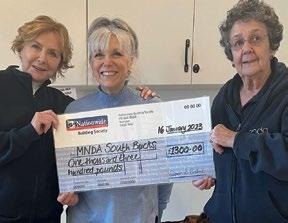
Carmel said: “On behalf of everyone at the Chiltern Branch we’d like to thank John’s family and friends for their generosity in organising this event. The funds raised will be used to support local families living with MND.”
other ways to get involved across the Association. These opportunities can be flexible, ranging from fundraising at a one-off event to volunteering with a local branch or group.
As well as giving something back, benefits of volunteering can include gaining skills, adding to your CV, meeting people and making new friends. Volunteering can also improve your wellbeing, boosting your confidence and mental health.
If you are interested in volunteering with the MND Association please have a look at current opportunities on our website or email volunteering@mndassociation.org.
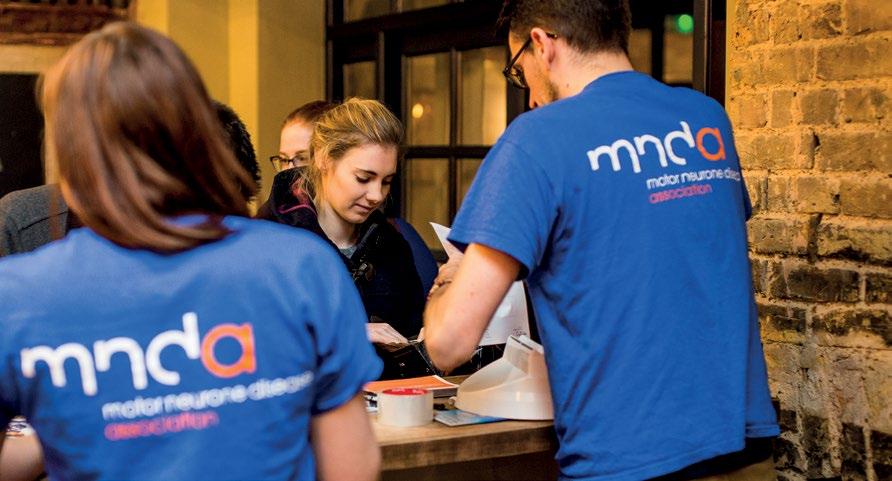
Due to the nature of MND it is essential that we work together to ensure families and individuals can continue to live as full a life as possible.Wynter Yeomans Left to right: Carmel Grant (Chiltern Branch Vice Chair and Association visitor), Lizzie Smith, Cyndy Mepham (Chiltern Branch Contact)
Spencer Williams hasn't let an MND diagnosis in 2022 stop him sharing his love of modern art with visitors to a world-renowned gallery.
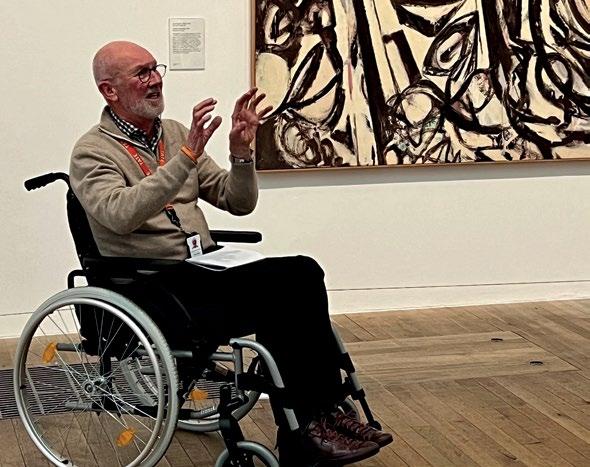
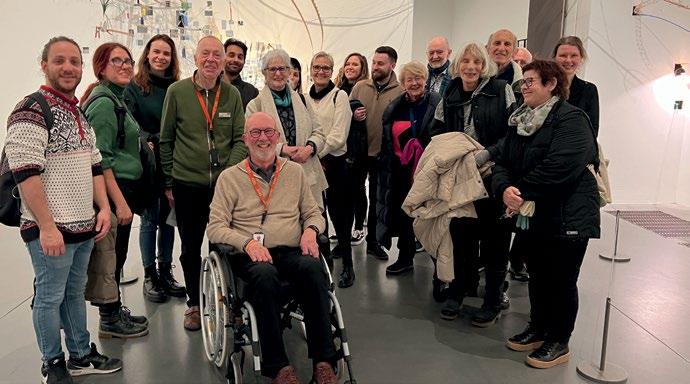
For the last six years, the retired solicitor has been conducting a monthly tour at Tate Modern in London.
Nowadays, Spencer conducts tours in his wheelchair. His enthusiasm for art remains and the tour is as popular as ever.
“I always had an interest in art – modern art in particular,” Spencer said. “Having worked as a solicitor for more than 40 years based all around London, I wanted to keep a connection with the city.”
Following his retirement, Spencer initially became a City of London tour guide showing tourists around some of the capital’s most famous buildings, churches and gardens. He then moved on to Guildhall Art Gallery before getting the opportunity at Tate Modern. He now leads his tour alongside senior guide and close friend, Ray Warburton.
He said: “MND has affected me badly in terms of walking but it hasn’t affected my voice, so I’m lucky I can still talk. After my diagnosis, it was important for me to keep going and do as much as possible to lead the life I lived before. The beauty of the art galleries at Tate Modern is that all the displays are on one level. Ray and I have a complete free rein of what we talk about –we don’t follow a particular pattern.”
The challenge of explaining art to the general public is one Spencer relishes. He says: “What is really worthwhile, is explaining what the art is about, the background of the artist, and why I like it. The tour allows me to put across my enthusiasm to people.”
During the Covid-19 lockdown, Spencer spent his time writing monthly articles
for Tate Modern, which are now stored as archives for the public to view.
He said: “During the pandemic, I thought I would only be writing for four or five weeks but the articles were so well received I carried on for 60 weeks!”
Spencer is currently conducting a free 45-minute tour at the gallery with a ’materials and objects’ theme.
MND has affected me badly in terms of walking, but it hasn’t affected my voice, so I’m lucky I can still talk.
After my diagnosis, it was important for me to keep going and do as much as possible to lead the life I lived before.
Spencer Williams
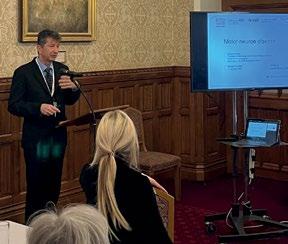
On 8 February, Parliamentarians, researchers, campaigners, and people affected by MND gathered in the House of Lords to mark 20 years of of the All-Party Parliamentary Group (APPG) on MND.
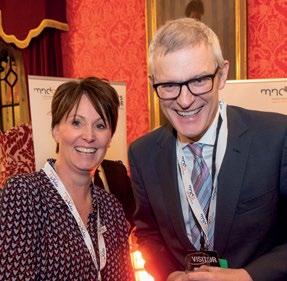
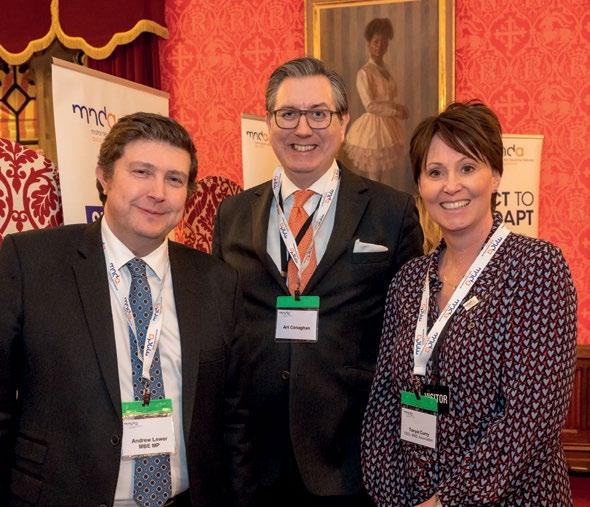
Established in 2002, the APPG provides a cross-party forum where Parliamentarians meet to hear about the disease, how it affects people, and how they can campaign at a national and local level for the policy changes needed by those living with MND.
Association patron Jeremy Vine and trustee Ian Lev, who is living with MND, started the evening with their reflections of the Group's success in achieving landmark funding for MND research, and influencing the change of the rules around
access to terminal illness benefits. Both speakers encouraged Parliamentarians to continue supporting the Group, which provides a voice in Parliament for people living with MND.
Guests also heard from previous Chairs of the APPG about their personal motives for leading the Group during their time
in Parliament, before the Association's Chief Executive, Tanya Curry, brought the evening to a close.
The event was a great success and testament to the hard work of many people living with MND over the years, as well as Parliamentarians, Association volunteers and staff.
In January, 11 Peers gathered in the House of Lords for an Awareness
Afternoon Tea hosted on behalf of the All-Party Parliamentary Group (APPG) on MND.
The event was opened by Association patron Baroness Finlay of Llandaff and covered various topics including research, support for unpaid carers of people living with MND, as well as the importance of Peer involvement in the APPG on MND.
Neurologist Professor Ammar Al-Chalabi detailed the latest advances in MND research and reiterated the need
for a more co-ordinated and efficient process when accessing the £50 million Government funding towards targeted MND research.
They were also joined by Sue Lodge and her husband, Steve, who gave an inspiring talk on Sue’s experience of living with MND – from being diagnosed with Primary Lateral Sclerosis (PLS), to the financial and emotional toll the disease has taken on Sue and her family.
The event resulted in a number of Peers pledging their support and commitment to join the APPG.
the walk said: “Justin was a brilliant colleague and we wanted to show him how much he meant to us all by doing this fundraising walk in his name. A group of us set off in the early hours from the Royal Liver Building in Liverpool and walked for over 11 hours to Sale, close to Justin’s home.
“It was an incredible day, and it was great to be joined by Justin’s daughter Tilly along the way, as well as a number of other supporters and family members. We had a WhatsApp group set up so we could post live photos all day and share messages with Justin – it meant he was able to follow our progress. With his dad’s help and the eye gaze technology which now helps him to communicate, he could share his own notes of encouragement. At the end of the walk, we all took it in turns to pop in and talk to Justin.”
A team of staff at Merseyside food and drinks firm, Princes, walked 35 miles from Liverpool to Sale, in Trafford last December to raise awareness of MND – inspired by their friend and colleague Justin Hammond.
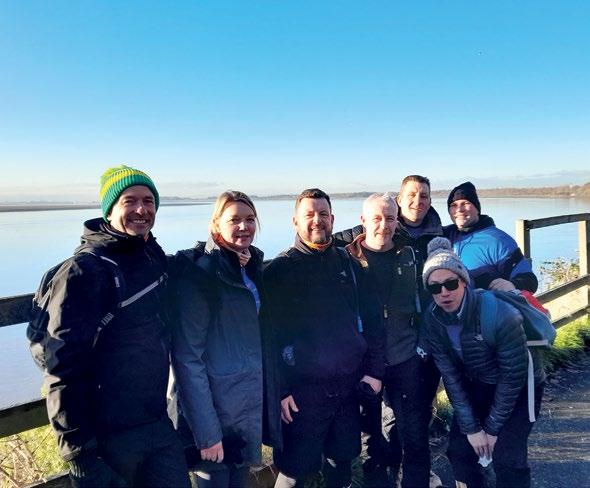
Justin, 50, was a sales director at Princes, where he worked for 12 years, and was diagnosed with MND just over 18 months ago. The challenge represented Justin’s 35-mile daily commute.
Adam Norcott, who helped organise
A few weeks later, staff at Princes hosted a bake sale and raffle at their headquarters. This gave other colleagues an opportunity to show their support and add to the fundraising total which topped £51,000 for the MND Association. Justin sadly died from MND the same night.
Adam is planning a future gym-based event to continue to raise awareness of MND and fundraise in Justin’s name.
Fundraiser Jeremy Daubeny has completed a cycling trip from the UK to Greece alongside his girlfriend, Lottie, raising thousands of pounds for MND research.
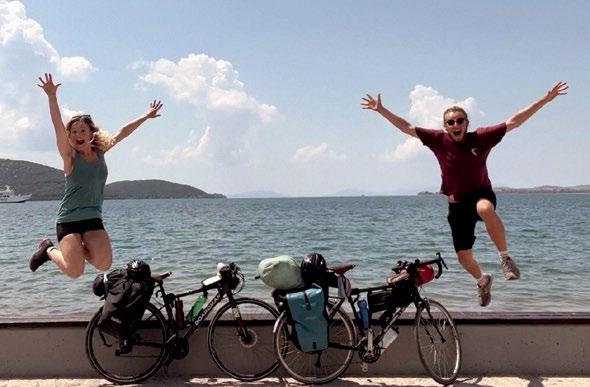
The couple set off last June and made their way through France, Italy, Slovenia, Bosnia, Montenegro and Albania, before reaching Greece. They raised well over £7,000, half of which will come directly to the MND Association.
Jeremy's dad, Giles, died of a brain tumour in 2018 and the following year his mum, Clare, died after living with MND for three years. Jeremy pledged to play his part and hopped on his bike to raise vital funds for research into both conditions.
Jeremy said: “I started bike touring last year in memory of my parents who both battled with the most brutal of conditions. They were the most unconditionally loving and devoted parents I could’ve asked for. With borders opening up after the pandemic last year, I set off with Lottie towards Greece. The journey was a marathon, not a sprint. The thing that
will stay with us the most is the humbling kindness of strangers. People opened their doors, hearts, fridges and lives to both of us and we are thankful beyond belief to all those who have supported us. Who knows
what the next challenge may be but we’re sure this won’t be the last.”
Jeremy and Lottie’s trip racked up 2,197 miles, 69 days, approximately 665 bananas, 52 pesto pastas and 276 espressos.
Nadine Johnrose-Richardson can vouch for the outstanding care offered by our MND Care Centres.
Nadine’s husband, Len Johnrose, a former professional footballer who died from MND last August, was supported by the team at Lancashire and South Cumbria Care Centre based at the Brock Assessment Centre at Royal Preston Hospital.
Nadine said: “The support we had in our area for Len from the MND Care Centre at Royal Preston Hospital was amazing. There was always someone there to help and prepared to do whatever they could.”
Since 1990, the Association has funded MND Care Centres across England, Wales and Northern Ireland to improve support for people living with MND.
MND Care Centres improve the support and co-ordination of services for people living with MND by providing access to a multidisciplinary care team via a single point of contact, as well as a dedicated MND clinic, all under one roof.
MND Care Centre nurses work with Association visitors to support people with MND by attending meet and greet sessions at local hospices.
Pauline Callagher, Lead MND Specialist Nurse/Co-ordinator at the Care Centre in Preston, said: “We have a really good working relationship with the Association and its volunteers. We have also been successful in grant applications which has seen us recruit a Family Support Worker, Catriona Bamber, one day a week – her
role is funded by the Association for the next four years.”
Straight after diagnosis, people with MND are assigned a specialist nurse, giving them their one point of contact. Within two weeks, they are visited at home. They also have a direct line to contact the nurses’ office.
Professor Suresh Chhetri, MND Care Centre Director, said: “It gives extra peace of mind so they don’t have to tell their story to multiple healthcare professionals. The teamwork here goes beyond excellence.”
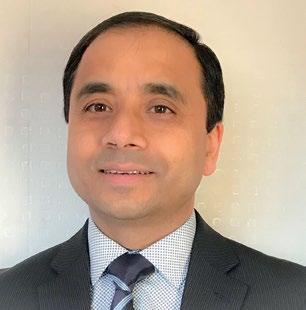
Nurses regularly refer people with MND for equipment grants from the Association.
Malabika Ghosh, Occupational Therapist at the MND Care Centre, said: “Without the Association’s help, our patients would be
With the support of our wonderful members, last year’s Christmas raffle raised an incredible £135,000. Thank you to all those who gave their support. We hope that you will do so again with the summer raffle – which is now open!
Every £1 ticket sold gives you the chance of winning a fantastic top prize of £5,000. Not only that, your support will help to fund vital research and make sure that
nobody faces MND alone.
You can enter the raffle online at www.mnda.raffleentry.org.uk to be in with your chance of winning this summer, or by calling our dedicated affle hotline (0330 002 0342).

As well as buying tickets yourself through the hotline, why not order some to sell to friends, family, colleagues and neighbours?
Raffle entry closes on Friday 7 July and the lucky winners will be drawn a week later.
waiting much longer for equipment.”
Also at the site are a neurophysiology unit used to conduct nerve condition studies which determine an MND diagnosis, as well as a research unit allowing people with MND to take part in clinical drug trials. This has previously included Riluzole – the only drug currently licenced for treating MND in the UK.
According to Professor Chhetri, we are now at the tipping point in terms of a breakthrough in effective treatments for MND.
He said: “Ten years ago we thought MND was incurable. The strides that have been made mean there are now a lot of things we can do. We see bright horizons and they will get brighter as we continue to evolve. It’s a matter of when, not if.”
Ten years ago we thought MND was incurable. The strides that have been made mean there are now a lot of things we can do. We see bright horizons and they will get brighter as we continue to evolve. It’s a matter of when, not if.
Following their hugely successful past galas, brothers Neil and Carl Rutherford are back to present their latest event to raise funds for the fight against MND.
Neil and Carl’s new gala will bring the West End to the Gordon Craig Theatre in Stevenage on Sunday 4 June, to raise funds for the MND Association and MND Scotland. Their previous galas have raised nearly £20,000.
Neil and Carl’s father, Iain, died from MND in 2015. Iain was a keen musician and performer, and the family often performed in musicals together at the Gordon Craig Theatre with local amateur dramatics companies. As a result, Neil and Carl joined the performing arts professionally and went on to work on many West End musicals including City of Angels, Fiddler on the Roof and Oliver!
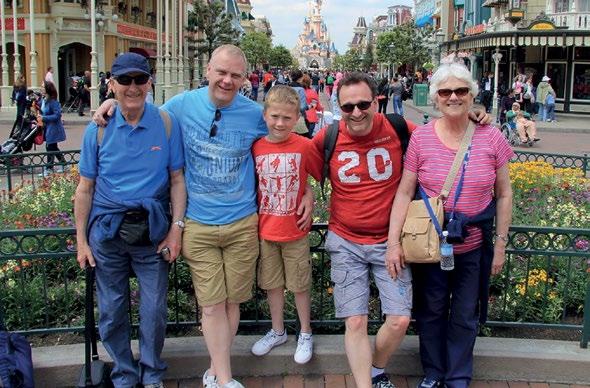
Separately, Carl was General Manager for the National Youth Music Theatre and also worked at the Gordon Craig Theatre, while Neil was Head of Casting and Production Associate for the Ambassador Theatre Group, casting and producing musicals and plays in the West End, Broadway, Australia and all around the world.
Their gala evening will include performances from West End stars James Hume from Phantom of the Opera and Les Miserables, Hayley Tamaddon from Chorus Line and previously Coronation Street,
Kelly Price from Guys and Dolls, as well as Matthew Croke from Aladdin
Neil and Carl jointly said: “Dad was a terrific pianist and singer, and he loved musical theatre. We think he’d be so pleased to know that the things he loved most in his life – his family, friends and music – will combine together for this gala to raise money to help people living with MND. And wherever he may be, we’re certain he’ll be singing along.”
The gala will see the West End stars sing songs from hit musicals, accompanied by a
36-piece professional orchestra and a choir of 40, made up of students from leading drama school, Mountview. It will also be hosted by a surprise celebrity guest. Tickets can be booked at the Gordon Craig Theatre website or by calling 01438 363200.
There will also be a moment of remembrance at the gala. If you would like to remember someone who died from MND, please send a digital photograph and their name to neil@neilrutherford.com and they will be remembered on the night.
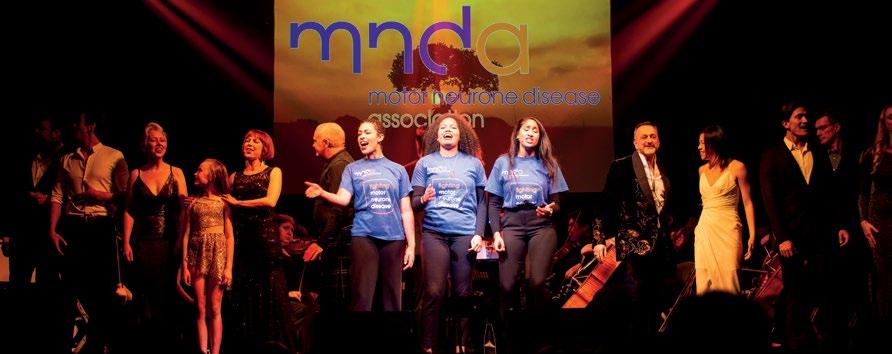
A gruelling 24-hour bike ride didn’t faze Greg Culshaw who completed the challenge in memory of his Toyota (GB) colleague Rachel.
After Rachel died from MND last year, Greg decided to raise funds by riding the static bike through a whole day and night at Toyota’s head office in Epsom last November.
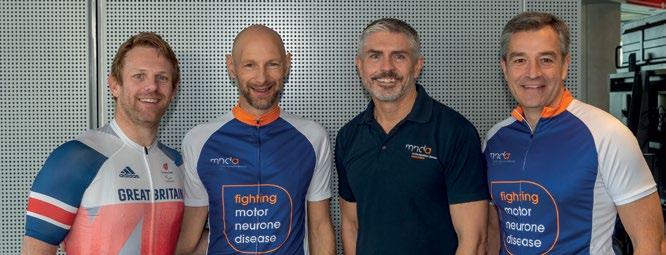

Throughout the challenge, Greg was joined by Jody Cundy, Team GB Paralympian, and various Toyota (GB) employees who were able to provide a morale boost. Also there to support was Mark Chapman, our Director of Finance, and David Setters, who is living with MND.
He successfully completed his challenge and
raised £18,104 which was topped up to £40,000 by Toyota.
Greg said: “Thank you to everyone who supported me along the way in my challenge to ride for 24 hours for MND and raise funds in memory of my colleague Rachel. The money that we’ve raised for the Motor Neurone Disease Association is phenomenal and I know that Rachel would be super proud of this.”
The MND Association is halfway through a three-year partnership with Toyota (GB). So far the team has raised more than £125,000 undertaking all manner of fundraising activities including the Three Peaks challenge, auctions, football tournaments and even selling honey from their onsite bees.
The money that we’ve raised for the Motor Neurone Disease Association is phenomenal and I know that Rachel would be super proud of this.
Greg CulshawLeft to right: Jody Cundy, Greg Culshaw, Mark Chapman and Agustín Martín Greg Culshaw (pictured centre) is joined by Agustín Martín, President and Managing Director of Toyota (GB) (left) and Jody Cundy (right) during his 24-hour bike ride fundraiser
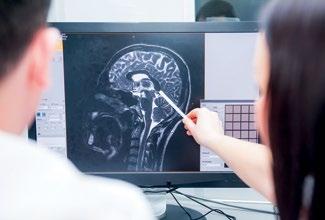
The NICE guideline recommends that a neurologist should be a core member of the MND care team. If this is not the case, or you are seeking a diagnosis, ask your GP to refer you. Neurologists may be based in a variety of settings, including outpatients’ clinics, regional centres or hospitals.
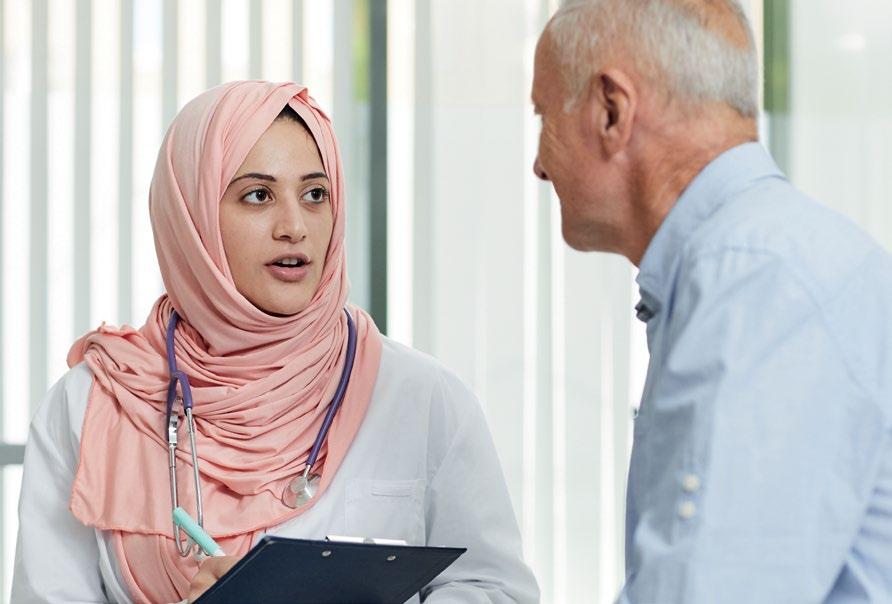
Neurologists are specialist doctors who diagnose and treat conditions affecting both the brain and spinal cord. They also manage disorders of the nerves and muscles which activate movement and transmit messages from around the body to the brain.
There is no single test to prove someone has MND, so testing can only rule out other possible conditions.
For that reason, confirming a diagnosis of MND can take time. The neurologist will ask about your medical and family history, medications and current symptoms. They will carry out a number of tests to measure co-ordination, balance, reflexes, muscle strength and sensation. They may also arrange blood, urine or other fluid tests.
Neurologists can support people to manage conditions such as epilepsy, Parkinson’s disease and MND. They can help with managing symptoms and give advice on care management. They are a core member
of the MND multidisciplinary team, and work with a wide range of health and social care professionals to make decisions to provide effective support.
Neurologists may specialise in certain conditions, including MND. Others, known as general neurologists, have a broader remit and less experience of the disease. Some neurologists carry out research, including clinical trials, to try to add to the understanding of diseases.
When nine-year-old Martin Smith sat down in March last year to begin writing his own book, Arnold and Tibbles, little did he know it would go on to raise funds towards the fight against MND.
When the illustrated book was completed, he decided all money raised from its sale would go to the MND Association.
Martin’s grandmother, Monica, was a given a copy for her 70th birthday last year before she died from MND in July, with Martin having completed all ten chapters in just over a month.
Graham, Martin’s dad, said: “Monica was unable to turn the pages but we read the story to her and she was delighted and impressed by how much work Martin had put into the book. Over the course of the summer holidays we decided to engage with a professional illustrator so we could properly dedicate the book to Granny’s memory for she loved to read and had also written stories as a child about animals.”
Martin's book tells the story of Arnold,
a meandering armadillo, and Tibbles, a quick-witted rabbit, who become firm friends as they launch into an unintended
adventure where they make new acquaintances and rely on each other to get themselves home.
Graham said: “When the illustrated book was ready around Christmas time, Martin and I decided to reach out to the MND Association to suggest the book might do some good and raise money for research or support.”
Martin described the book as a tribute to his grandmother. He also went to school dressed as one of his own characters, Arnold, for World Book Day earlier this year.
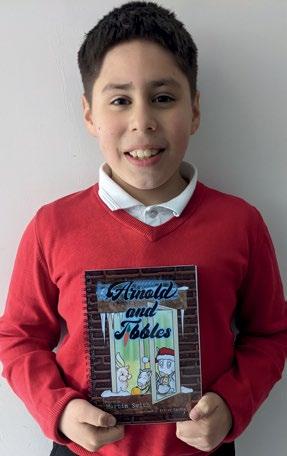
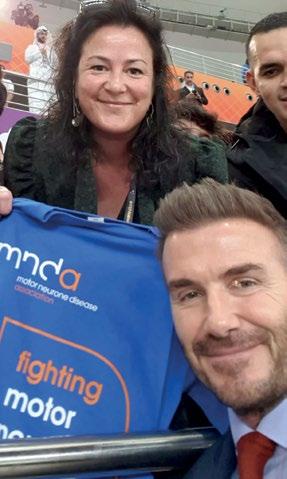

When the illustrated book was ready around Christmas time, Martin and I decided to reach out to the MND Association to suggest the book might do some good and raise money for research or support.Colin McIntyre raises awareness of MND as he takes in a game at the Qatar 2022 World Cup David Beckham joins Victoria McIntyre to raise awareness of MND at the World Cup in Qatar Martin Smith (now 10) with his book ‘Arnold and Tibbles’
Shahla Croxford was inspired to sign up as a campaigns volunteer following the death of her husband last year.
Shahla had no previous experience in campaigning but her own experiences sparked a passion to push for change.
Shahla said: “My husband, my rock and best friend, John lost the battle against the devastating MND in July 2022, which he had to endure mostly during lockdown and in isolation. Amazingly, he fought with courage, patience, realism, and his Yorkshire sense of humour which gave me strength to continue caring for him.”
A retired physiotherapist, Shahla had never supported anyone with MND before.
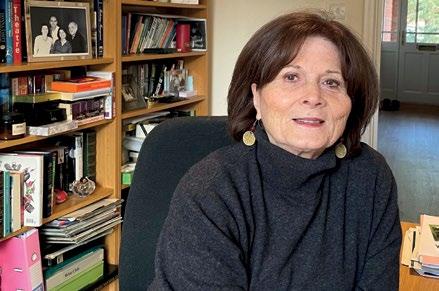
She said: “In order to help him, I needed to make sure not to be depleted of energy. I had to reach for my inner strength and, believe me, it is there. We had a bumpy journey caused by confusion and having to seek out various solutions, which caused added stress and anxiety.”
It was that experience which made Shahla determined to campaign on behalf of people affected by MND.
She said: “I was very apprehensive initially, but with great mentoring and kind suggestions from the more experienced campaigners, there was nothing to lose. I have met with my councillor regarding adopting the MND Charter and the Act to Adapt campaign, to make sure people with MND lead a life with dignity they deserve. I also contacted my MP who is a GP and amazingly sympathetic regarding Continuing Health Care (CHC)”.
The Association has a brilliant group of determined campaigns volunteers, like Shahla, who work to raise awareness of MND and influence decision makers up and down the country. They have played a huge part in our campaign successes over the last few years.
From increasing access to benefits through the Scrap 6 Months campaign, to the £50 million of Government funding for targeted MND research, our campaigners have never shied away from fighting for change.
Whether you would like to build a relationship with your local councillors or support campaigns online through social media advocacy, there is a place for you as a campaigns volunteer.
To join a friendly and dedicated team of campaigners, scan the QR code.
People living with MND deserve good quality care.
It is often family members who take on the bulk of caring responsibilities. But they are not getting the support they need.
Our research has found 53% of unpaid carers are physically and mentally exhausted, unable to access breaks and are also impacted financially. Many are juggling caring with work and additional parental responsibilities.
But only one in four carers of people with MND we spoke to had either received a Carer’s Assessment or were in the process of having one.
Carer’s assessments help to identify the needs of carers so that they can be offered the appropriate services and assistance to feel supported within their role.
That support might include help with housework, training to help with caring, breaks from caring or emotional support such as counselling.
Help support our Support MND Carers campaign by using our handy tool to write to your MP, urging them to back our call for a government review into carer’s assessments.
Scan the QR code to write to your MP or visit www.mndassociation.org/ supportmndcarers for more information.


Additionally, we are supporting our campaign volunteers who are arranging face-to-face meetings with their MPs about the Support MND Carers campaign. If this is something you would like help with, please email campaigns@ mndassociation.org
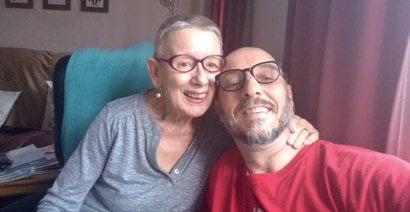
If you’d like to hear more about the campaign listen to episode 24 of the MND Matters podcast with guest host Charlotte Hawkins, presenter on ITV's Good Morning Britain.
David (pictured with his wife Sandy) shared his story of caring for his wife, Sandy, who had MND.
He was not offered a Carer’s Assessment and, as a result, had little help. David and Sandy spent only four hours apart in four years.
Carers have a right to have their needs assessed and adequate support provided but this is not happening. With your help, we can change this. Email your MP today.
Eva Sundin is a Professor of Psychology at Nottingham Trent University who is living with MND and multiple sclerosis (MS). Dr Masuma Rahim is a Principal Clinical Psychologist in Eva’s multidisciplinary care team at Tower Hamlets Community Neuro Team.
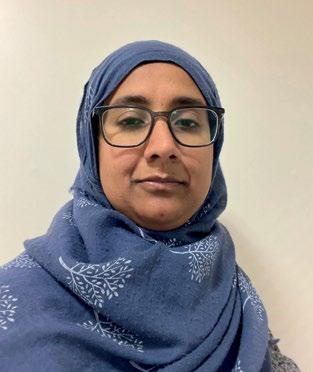
Ahead of Mental Health Awareness Week in May, they asked people living with MND to share some of the ways they cope in the hope it may help other readers of Thumb Print.
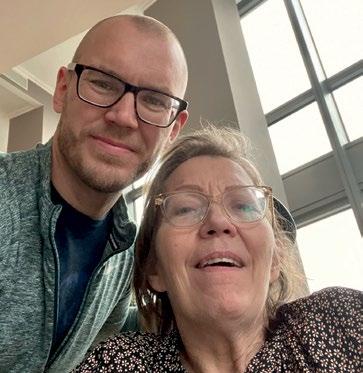
Eva said: “Two individuals will not react in the same way to an earthquake, but they will have strong reactions of various kinds when they are in the midst of one.”
Arthit's approach:
Arthit, who is living with MND, says his children mean everything to him and describes his wife as his ‘pillar’ who is always there – even when he has problems sleeping at night, she stays with him. He takes help from his family to take things one day at a time.
He said: “I didn’t have stresses and worries before MND.”
Eric's approach:
Eric was an active person before his diagnosis. When he finds himself thinking about MND too much, he reassures himself that the difficult thoughts and feelings will not last too long and tries to distract himself. Lately, organising events to raise money for the MND Association has kept his mind on what he enjoys. Eric also likes going to the theatre and cinema, local pubs, or to grab a bite to eat.
He said: “I now spend more time indoors and meet friends for coffee. I try to keep busy and not think too much about my condition. I use my manual wheelchair and all places we visit are well set up for disabled guests. People are all very helpful too. When we’re not out I try to keep myself busy around the house, on my laptop, watching TV or reading.”
Masuma told us: “In a similar way, MND affects every area of a person’s life and living with it is, at times, frightening and stressful. But many people find ways of coming to terms with the diagnosis and maintaining a good quality of life.”
Bonnie's approach:
Bonnie refuses to let MND take the good out of the present moment and tries to make the most of all things she still can do, instead of dwelling on the negatives of MND. She said: “This is not an overnight process but given time, I can arrive at a semi-peace with them.”
Dina's approach:
Dina sought guidance from her family after diagnosis. Her daughter and son-in-law suggested an acceptance therapy might help her. She tried it and found its focus on what really matters in one’s life to be a useful compass.
Dina said: “Every time MND hits in a new body part I remind myself that I made a useful choice when deciding to keep learning new things for as long as it’s possible.”
Ziaur's approach:
When Ziaur was diagnosed with MND, he moved downstairs to be able to continue socialising with others. His family are very supportive. He uses eye gaze technology to chat with family and friends. When he was worrying about losing his ability to communicate with others, he comforted himself, saying his resourcefulness had helped him many times before. He remembers a story from the Quran in which he says God tested Ayyub in a similar way he is tested by MND. Ziaur feels closer to God now than before getting MND.
He said: “Life is temporary, and therefore this illness is only temporary.”
MND affects every area of a person’s life and living with it is, at times, frightening and stressful. But many people find ways of coming to terms with the diagnosis and maintaining a good quality of life.Dr Masuma Rahim

Punit Mistry has climbed Mount Kilimanjaro in memory of his beloved father, a challenge he said would have embodied his dad’s spirit.
Punit’s father died from MND in March 2019 and it only took a few days for him to decide the type of fundraising activity he wanted to do.
He said: “My cousin and I sat there and thought, ‘what would Dad do if he was with us?’ He’d do something that says ‘MND you can’t stop us’. So we looked at what we could do to help fight it. We wanted to do something different, so we chose something we hadn’t done before – trekking a mountain. Not just any mountain. This was the kind of challenge Dad would do’.’
Punit’s close friend, Nayan, also died from MND in January 2021. As Punit climbed 6,000m up Kilimanjaro, he said he felt the
presence of both men close to him. He said: “The challenge was simply incredible. Words or even pictures can’t really describe the journey, because it was such a unique feeling. I’d highly recommend it to anyone. I felt Dad and Nayan’s presence when it got tough. Every step towards the end on summit night was a challenge, but I pictured my dad with his arm around me supporting me up, telling me ’nothing can stop you.’ We got there. Clouds surrounding us. What a feeling.”
Punit’s challenge raised £15,000 for the MND Association and he made some lifelong friends in fellow climbers he met along the way.
He said: “I know Dad and Nayan were watching us both climb, both smiling away. Without a dad like him, I wouldn’t have even considered it. Dad, and Nayan battled MND so bravely, as I feel all MND warriors do. Everyone has different stories, but they are all heroes in one way or another.”
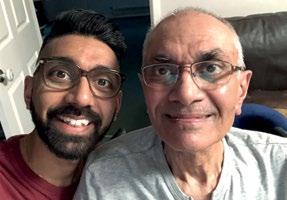
With National Walking Month on the horizon in May, now might be the perfect time to think about getting together for a walk.
Bring together friends, family and colleagues, or indeed the whole community, for a fundraising walk and you’ll bring us a step closer to a world free from MND.
There are two ways you can take part and Walk to d’feet MND – by hosting your own walk or joining an existing event which is open to the public.
The MND Association will support you every step of the way. We’ll provide branded t-shirts to raise awareness on the day and help you access our Template Centre where you can create materials to promote your walk in just a few clicks.
Kathleen teamed up with her two sons, Sam and Connor, for a walk in memory
of her husband, David. They called themselves ‘David’s MND D’feeters’ and walked the 96mile West Highland Way.
Kathleen said: “David and I were always walking, we loved the great outdoors, so I thought a walk would be a good way to fundraise. The MND Association had been there with help, support and advice for us both since his diagnosis. I wanted to give back something as a thank you. I’m hoping that the money raised will help them continue crucial research into treatments and a cure, as well as supporting those affected by MND.”
Alternatively, join an existing walk, by selecting an event near you on our new event finder. Walk to d’feet isn’t necessarily about walking a huge distance, it’s about joining together as a community to raise
awareness and unite in the fight against MND.
Last year, Rebecca Slegg took part in the Walk to d’feet MND event organised by the Colchester and North East Essex Group, held at Frinton-on-Sea.
Rebecca said: “Taking part in our local Walk to d’feet event provides the perfect opportunity for us to come together with family and friends to remember our dad and give back to the charity that gave us so much support after his diagnosis. We always have such a lovely time meeting other families affected by MND, sharing stories and a delicious ice cream halfway along the route.”
Help bring us a step closer to a world free from MND today. Register to receive your fundraising pack, or find a walk near you by visiting www.mndassociation.org/walk

Helen Copsey, MND Care and Research Network Co-ordinator for Norfolk has been awarded the Edith Cavell Award for outstanding leadership in her field.

Helen received the prestigious nursing award for her dedication to the Norfolk Care Network and her drive to continually improve services for people affected by MND and the multidisciplinary teams which support them.
Although the award is presented to individuals, Helen was quick to pay tribute to her colleagues in the Care Network team based at Norfolk and Norwich University Hospital.
Helen said: “I was really surprised to win this award but am extremely proud as well. It really is about the whole team and the work we are doing to improve the lives of people living with MND.”
Part of Helen’s work included securing the MND respiratory physiotherapist, Emma Larner, for the area in 2018.
Helen recognised the need for people living with MND with complex respiratory symptoms to be able to access specialist respiratory support at home as well as in hospital. Emma’s post was initially funded by the MND Association for a year and was presented as a business case to the Norfolk and Norwich University Hospital prior to
My name is Susan Graham and I am honoured to be a guest editor for this edition of Thumb Print.
I am a member of the MND Association’s Promise Five Strategy Board and deeply committed to raising awareness of motor neurone disease. My personal connection to MND began when my sister, Jaspal, was diagnosed with the disease. Witnessing her decline and the toll it took on our family was a heartbreaking experience. In her memory and in honour of all those affected by MND, I founded Jaspal’s Voice with the goal of raising awareness and funds for communication equipment. Through Jaspal’s Voice, we have
organised events and raised funds to donate communication equipment to those with MND, so they can communicate with their family and friends. These efforts have helped raise awareness in many communities.
In my role as a guest editor for Thumb Print, I hope to bring attention to the experiences of individuals and families affected by this disease. I believe that by sharing our stories and knowledge, we can build a stronger and more supportive community for those affected by MND.
I am humbled to be part of the MND community and thank you for the opportunity to serve as a guest editor.
being permanently funded by the NHS.
Emma said: “Helen genuinely cares about people and continually goes above and beyond her duty of care for patients and their families. She does lots of work behind the scenes when someone is diagnosed to make sure their care is co-ordinated and referrals to healthcare services are made in a timely manner. She also offers invaluable psychological support both at diagnosis and throughout by being approachable and empathetic, as well as having a wealth of experience with MND.”
Helen has also set up bi-annual online education sessions for all healthcare professionals, university students and volunteers across Norfolk to continue to raise awareness of MND.
I was really surprised to win this award but am extremely proud as well. It really is about the whole team and the work we are doing to improve the lives of people living with MND.Helen Copsey received the Edith Cavell Award
Share your pictures at www.facebook.com/ mndassociation
If you are sending in photographs to feature on these pages please ensure you have full permission to use the images.
Aiming high: Ian Flatt, who is living with MND, climbed Mount Snowdon in his off-road wheelchair accompanied by a team of family, friends and specialist nurses. Ian has so far raised more than £12,000 split between the MND Association and Leeds Hospitals Charity.

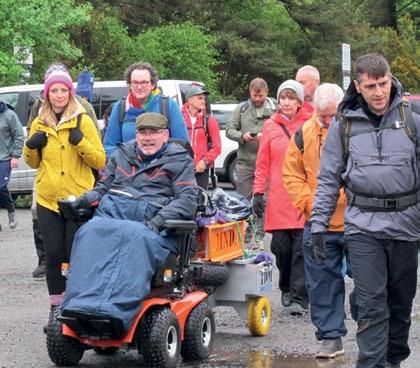
London to Paris cycle: Hema and Giles took on the four-day London to Paris cycle in September after their close friend Bill, died of MND in 2020. They raised £3,000. Hema said: “Watching Bill’s health deteriorate over two years was hard enough, but the hardest part to comprehend was that there was so little known about MND. That’s why we chose to do something to raise funds for research. Although MND took away Bill’s physical ability, throughout it all his mind remained sharp and his wit never dampened.”
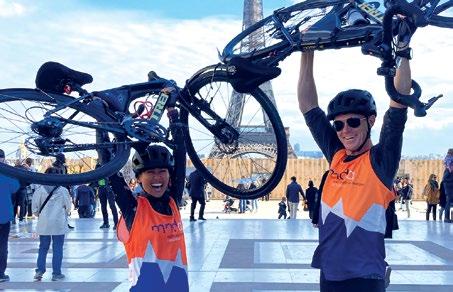
Yomp for Heroes: Team ‘Yomp for Heroes’ - Alex, Tony, Rob, Callum and Liam - took on the challenge of walking the 56 miles Special Forces selection route from Lulworth to Paignton, carrying more than 40kg each and eating only military ration packs. The military friends’ challenge was inspired by Alex’s dad Rob who was diagnosed with MND three years ago. Fittingly they crossed the finish line after a horrendously wet three days in December, on Rob’s 60th birthday, raising £6,495.
Swim4Esther: Swimming clubs in Devon made a splash over Christmas inspired by Esther Rookes, who is living with MND. Swim4Esther raised £4,600 with swimming coaches across the county also donating their time to provide one-to-one coaching.
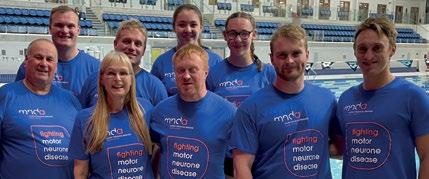
If you’ve been inspired to take part in a fundraising event for the Association, there are loads of ideas to make a difference at www.mndassociation.org/fundraising

Michelle’s fundraising drive: Since being diagnosed with MND in February 2022, Michelle Danvers has organised numerous fundraisers alongside work colleagues. So far they have raised more than £3,000 towards their £5,000 target, holding cake sales, auctions and sweepstakes. Michelle said: “I just hope to make a difference to help someone in the same position as me trying to live with this awful debilitating disease.”
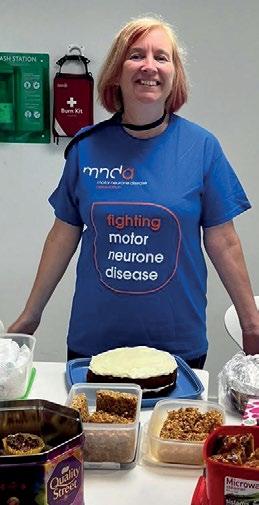
Village dramatics: Paul Kirkwood and the Green Hammerton Drama Group have put on several performances to raise £675. The group has been supporting their friend and neighbour Ian Flatt.
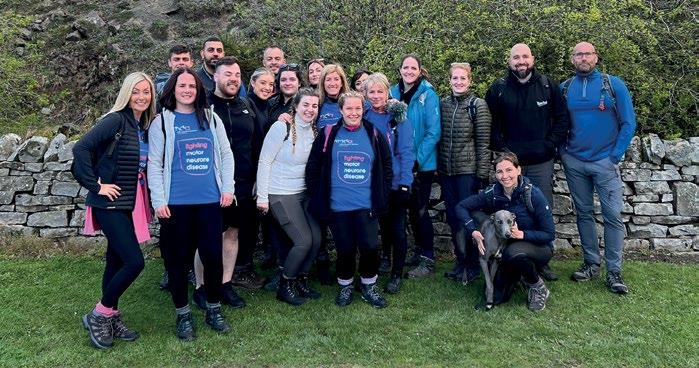
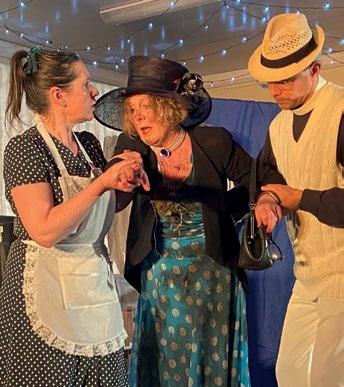
Walk along the wall: A team from Platinum Financial Ltd. and The Will Guys walked 17.5 miles of Hadrian’s Wall in memory of Angela and Tommy, relations of team members, who died from MND. Angela was the mother of Rebecca Patterson, while Tommy was the uncle of Darren Williams. The team’s efforts raised £2,437.
Rotary wheelchair push: Members of Rotary International District took part in a wheelchair push from Apperley Bridge in Bradford to Leeds City Centre and raised £1,035.
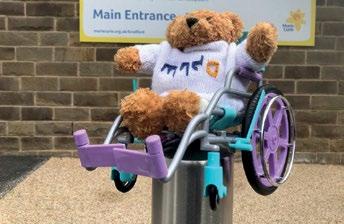
Half marathon memorial: Iris and Jon ran the Hull Half Marathon last June, raising £2,133 in memory of Iris’s aunt Hilary who died from MND in 2013. Iris said: “Seeing a loved one have to fight a battle with this disease made me realise how important it is to raise awareness about MND.”
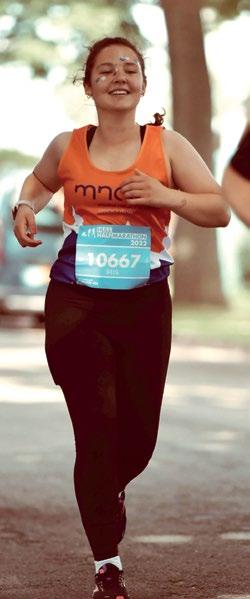
If you have something you would like to share with other members of the MND community, we would love to hear from you. Letters, which must include your full address, can be sent via email to editor@mndassociation.org or posted to Your letters, Thumb Print, Francis Crick House, 6 Summerhouse Road, Moulton Park, Northampton, NN3 6BJ Please note that letters may be edited. If you are including photographs please ensure you have full permission before sending.
A basket of spring flowers on her tricycle greeted mourners as they gathered to celebrate the remarkable life of former MND Association President Lady Hallifax – known to everyone as Anne.
of funding for the Association including the opening of an MND Care Centre in memory of her husband. As well as her presidency until 2006, she also gave emotional and practical support as a visitor to families in the Reading and West Berkshire area affected by “this cruel disease”.
Her son Tom said in his eulogy: “I believe her own experience of the illness, as she almost single-handedly cared for my father, gave her an understanding and empathy that was a very great help to many people in the most difficult circumstances imaginable.
her friendship with Anne at that time, recalled how they discovered, when chatting about naval families, that they had both lived in the same house in Malta at different times.
Joanna said: “She was such a lovely person in every way and has done so much to help others, I think she is someone about whom one would say that the world is a poorer place without her.”
Other tributes included one from Sally Light, former Chief Executive of the MND Association, who sent condolences to the branch and all those close to her.
Only two days before her unexpected death, aged 88, Anne had been pedalling up the same drive with the magnificent backdrop of Englefield House, the home of her nephew Lord Benyon.
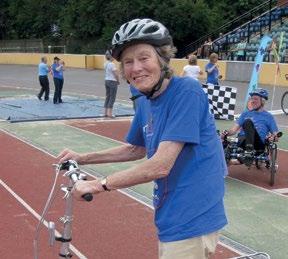
Hundreds of mourners packed into St Mark’s Church, Englefield, near Reading, to pay tribute and hear of the many qualities which proved invaluable in her amazing work for the fight against MND at both local and national levels.
Lady Hallifax became President of the Association after losing her husband, a Falklands War veteran, to MND in 1992. Admiral Sir David Hallifax was serving as Constable and Governor of Windsor Castle when he was diagnosed with the disease and the family moved to live at Englefield, then the home of his sister Elizabeth, Lady Benyon, and her husband Sir William.
Mourners heard how ‘kindness, charm and determination’ meant that Lady Hallifax was able to raise huge amounts
“She faced the great trials of her own life – the early death of her adored son Matt, and the illness and premature death of the husband to whom she was utterly devoted – with extraordinary stoicism, helped by her clear and simple faith, and by the support of the many, many friendships that her kind attention to others brought her.”
The Reading and West Berkshire Branch is now hoping to organise an event later this year in fond memory of Lady Hallifax who, despite being very frail, recently visited two of its festive events.
Former Chair Margaret Moss and myself, Publicity Officer Jane Gilbert, remember how we were both ‘recruited’ as volunteers by Anne back in 2000 after having lost close family to MND.
We agreed: “She was the lynchpin of the branch at that time when it was flagging and she worked tirelessly to keep it going. Her ability to build a team came with charm and a genuine, compassionate interest in others. Anne has now handed on the baton for her wonderful legacy to be continued.”
Former Association visitor and speech therapist Joanna Knott, who also began
“What an amazing woman she was,” she wrote. “Incredible to think how the world had changed in her lifetime.”
Anne, née Blakiston-Houston, was born in 1934 and raised on the County Down coast in Northern Ireland, one of five sisters and a brother. Though always elegant, she was a tomboy in her youth and went on to become a skilled potter, furniture and china restorer as well as an expert gardener creating, amongst others, a garden in the moat of the round tower at Windsor Castle.
The mother of Louisa, Tom and Matt, grandmother to Fergus, Lily, Una and Maya, she died suddenly at home in Englefield on 16 December.
After the funeral service, a retiring collection was held in aid of Anne’s four favourite charities including the MND Association. The Reading and West Berkshire Branch specifically received a very generous cheque for £1,000 from Prue Douglas-Menzies in memory and admiration of her older sister “who was so often busy at her desk writing to people who had lost someone dear to them. “
May Anne Rest in Peace.
Jane GilbertThe MND Association is committed to minimising impact on the environment. Our potato starch mailing wrapper, introduced in January, is derived from food industry waste and the energy used to manufacture it is less than that used to manufacture plastics. It is GMO free, doesn’t contain any plasticiser and will decompose to nutrients for the soil in only a few weeks.
For some years, Thumb Print has been printed on paper sourced and certified by the Forest Stewardship Council (FSC) and from this issue onwards we’re using carbon balanced paper, offset by the World Land Trust – an international conservation charity committed to buying and protecting environmentally-threatened land throughout the world.
You wanted to speak, That’s when I realised we all take our voices for granted. When a gentle soul like yours couldn’t, I wish I listened to you more often. The days you stopped speaking, You started writing more. Your handwriting, A pure bond.
You wrote letters to me, While I wrote them to your Dr’s. Your love letters grew each day, As your speech decreased. There’s a saying,
‘When you love someone, you can hear their voice While reading what they said’. When the love letters stopped, We could only re-read the ones you left behind. With a memory so special, I hope people know communicating through love letters is how we became closer than before, During that war.
Ramandeep Sandhu, whose dad died from MND
MND Matters is the Association’s monthly podcast, sharing stories, advice and information from and with members of the MND community and beyond. Listen to episodes on our website at www.mndassociation.org/mndmatters or search MND Matters in your chosen podcast provider.
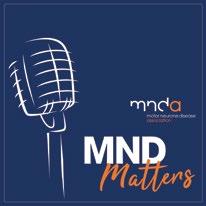
In this special episode, we went behind the scenes and followed our patron, Kevin Sinfield, as he completed his Ultra 7 in 7 challenge.
Join us as we look back on Sally Light’s 10 years as CEO of the MND Association. Sally answers questions from the MND community and reveals some of her personal highlights
As part of our #TakeOverMND campaign, listen to four mini episodes featuring individuals who have chosen to fundraise for the MND Association.
Join us alongside special guest host, Charlotte Hawkins from ITV's Good Morning Britain, as she speaks with Kuai Peng and David to discuss their experience of being an unpaid carer for somebody with MND.
We improve care and support for people with MND, their families and carers, and fund and promote research that leads to new understanding and treatments.
We also campaign and raise awareness so the needs of people with MND and everyone who cares for them are recognised and addressed by wider society. As a charity we rely on voluntary donations. Our vision is a world free from MND.
Online forum A place for people affected by MND to share experiences and support each other.
https://forum.mndassociation.org mndassociation mndassoc mndassoc
Our MND Connect helpline offers advice, practical and emotional support and signposting to other organisations.
Open Monday to Friday 9am to 5pm and 7pm to 10.30pm.
0808
802 6262 mndconnect@mndassociation.org
To receive a regular copy of Thumb Print, call 01604 611860 or email membership@ mndassociation.org
If you would prefer to receive your copy of Thumb Print under plain cover please let our membership team know.
